NURS2098: Comprehensive Recovery-Focused Care Plan for Ben
VerifiedAdded on 2023/04/25
|21
|3307
|194
Report
AI Summary
This assignment presents a recovery-focused nursing care plan developed for Ben, a 25-year-old male diagnosed with schizophrenia. The plan addresses three key issues: hallucinations and disturbed thought processes, sensory and perceptual alterations affecting daily living, and social isolation due to paranoid ideation and anxiety. For each issue, the plan identifies the consumer's strengths, specific interventions (both consumer and nursing-led), assigns responsibilities to various stakeholders including Ben, his parents, and the case manager, and sets timeframes for achieving goals. Interventions include therapeutic communication, environmental modifications, medication management, and social engagement strategies. The plan emphasizes partnership between the patient and care providers, aiming to improve Ben's mental condition, daily living activities, and social interactions.
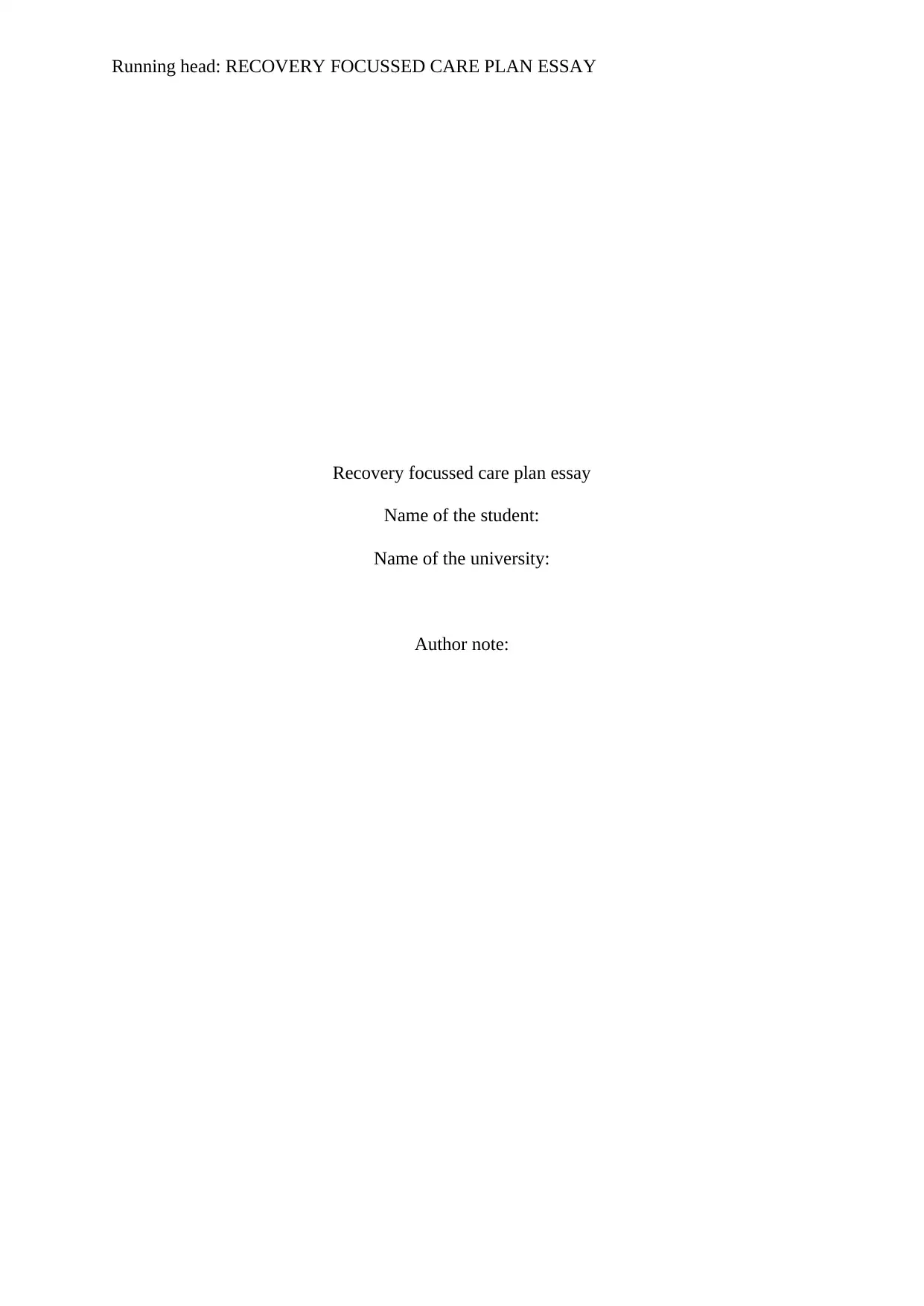
Running head: RECOVERY FOCUSSED CARE PLAN ESSAY
Recovery focussed care plan essay
Name of the student:
Name of the university:
Author note:
Recovery focussed care plan essay
Name of the student:
Name of the university:
Author note:
Secure Best Marks with AI Grader
Need help grading? Try our AI Grader for instant feedback on your assignments.
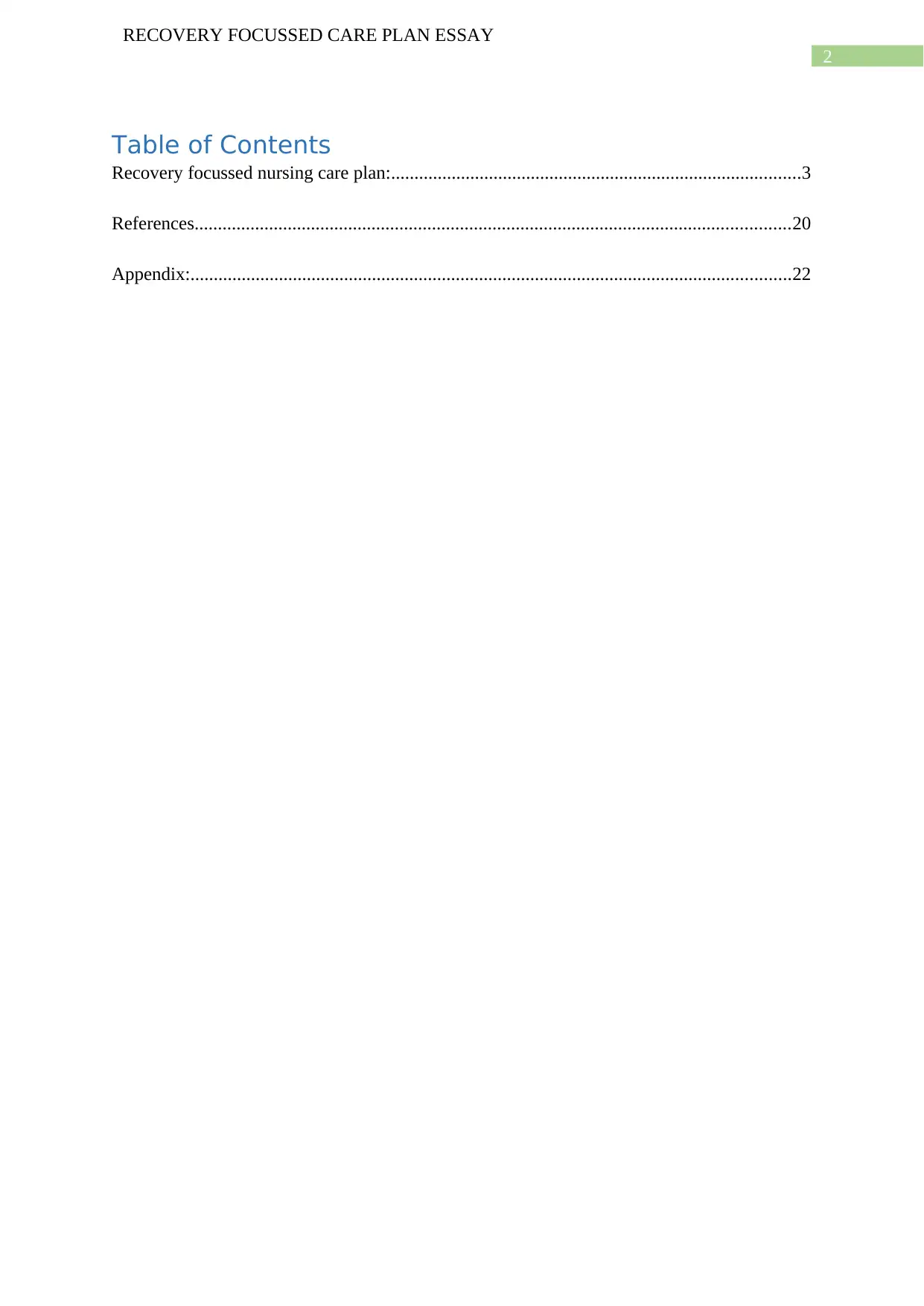
2
RECOVERY FOCUSSED CARE PLAN ESSAY
Table of Contents
Recovery focussed nursing care plan:........................................................................................3
References................................................................................................................................20
Appendix:.................................................................................................................................22
RECOVERY FOCUSSED CARE PLAN ESSAY
Table of Contents
Recovery focussed nursing care plan:........................................................................................3
References................................................................................................................................20
Appendix:.................................................................................................................................22
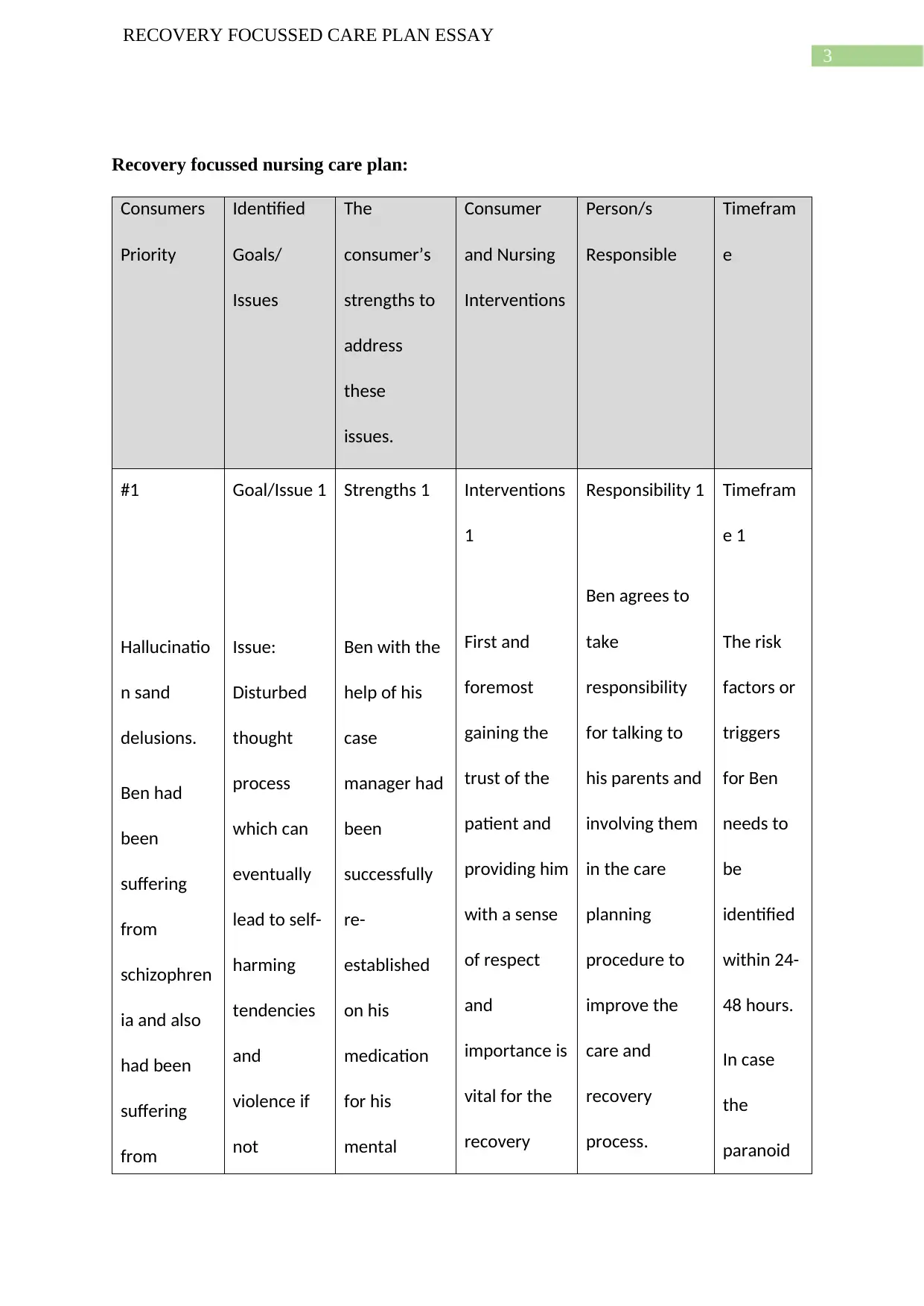
3
RECOVERY FOCUSSED CARE PLAN ESSAY
Recovery focussed nursing care plan:
Consumers
Priority
Identified
Goals/
Issues
The
consumer’s
strengths to
address
these
issues.
Consumer
and Nursing
Interventions
Person/s
Responsible
Timefram
e
#1
Hallucinatio
n sand
delusions.
Ben had
been
suffering
from
schizophren
ia and also
had been
suffering
from
Goal/Issue 1
Issue:
Disturbed
thought
process
which can
eventually
lead to self-
harming
tendencies
and
violence if
not
Strengths 1
Ben with the
help of his
case
manager had
been
successfully
re-
established
on his
medication
for his
mental
Interventions
1
First and
foremost
gaining the
trust of the
patient and
providing him
with a sense
of respect
and
importance is
vital for the
recovery
Responsibility 1
Ben agrees to
take
responsibility
for talking to
his parents and
involving them
in the care
planning
procedure to
improve the
care and
recovery
process.
Timefram
e 1
The risk
factors or
triggers
for Ben
needs to
be
identified
within 24-
48 hours.
In case
the
paranoid
RECOVERY FOCUSSED CARE PLAN ESSAY
Recovery focussed nursing care plan:
Consumers
Priority
Identified
Goals/
Issues
The
consumer’s
strengths to
address
these
issues.
Consumer
and Nursing
Interventions
Person/s
Responsible
Timefram
e
#1
Hallucinatio
n sand
delusions.
Ben had
been
suffering
from
schizophren
ia and also
had been
suffering
from
Goal/Issue 1
Issue:
Disturbed
thought
process
which can
eventually
lead to self-
harming
tendencies
and
violence if
not
Strengths 1
Ben with the
help of his
case
manager had
been
successfully
re-
established
on his
medication
for his
mental
Interventions
1
First and
foremost
gaining the
trust of the
patient and
providing him
with a sense
of respect
and
importance is
vital for the
recovery
Responsibility 1
Ben agrees to
take
responsibility
for talking to
his parents and
involving them
in the care
planning
procedure to
improve the
care and
recovery
process.
Timefram
e 1
The risk
factors or
triggers
for Ben
needs to
be
identified
within 24-
48 hours.
In case
the
paranoid
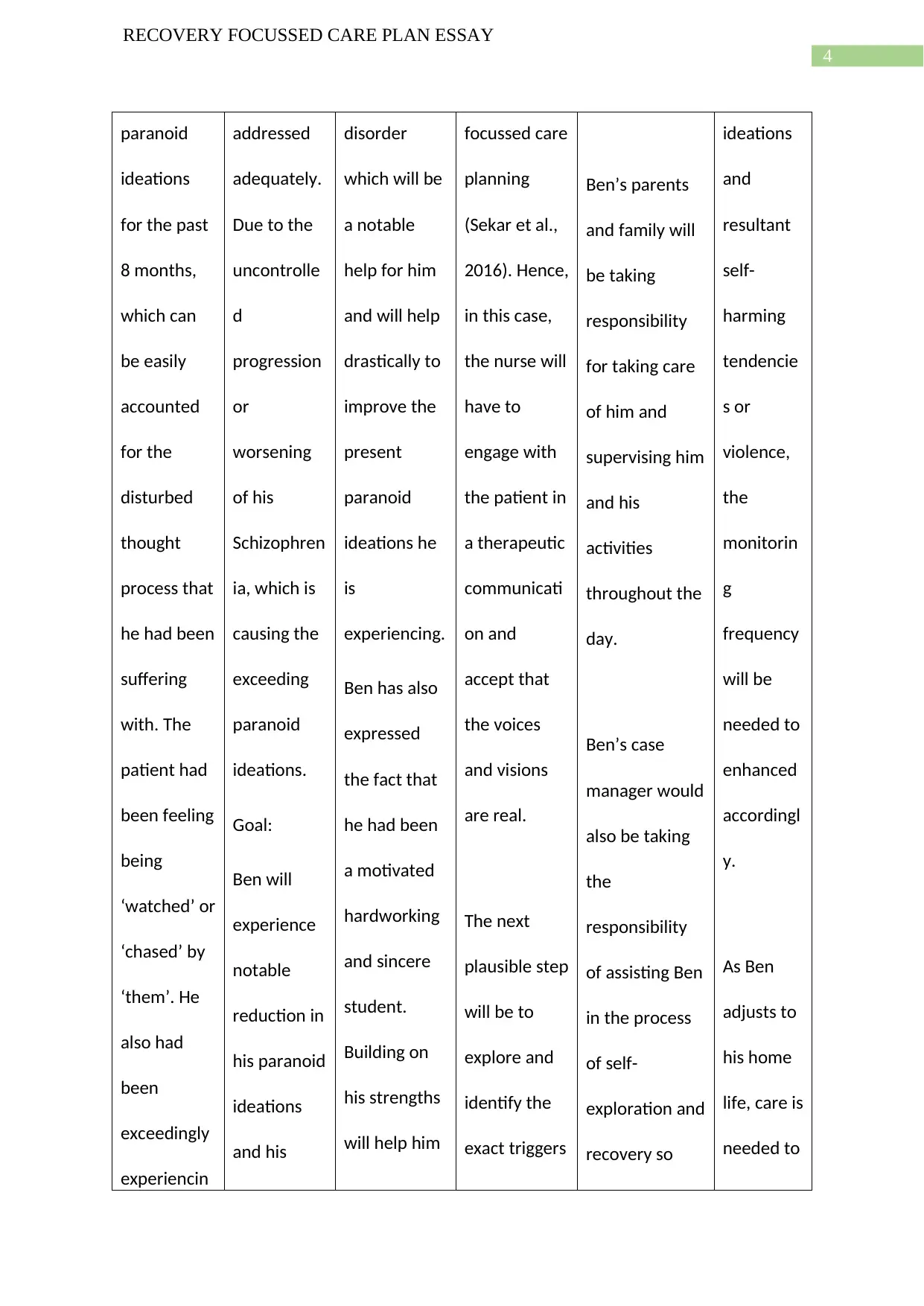
4
RECOVERY FOCUSSED CARE PLAN ESSAY
paranoid
ideations
for the past
8 months,
which can
be easily
accounted
for the
disturbed
thought
process that
he had been
suffering
with. The
patient had
been feeling
being
‘watched’ or
‘chased’ by
‘them’. He
also had
been
exceedingly
experiencin
addressed
adequately.
Due to the
uncontrolle
d
progression
or
worsening
of his
Schizophren
ia, which is
causing the
exceeding
paranoid
ideations.
Goal:
Ben will
experience
notable
reduction in
his paranoid
ideations
and his
disorder
which will be
a notable
help for him
and will help
drastically to
improve the
present
paranoid
ideations he
is
experiencing.
Ben has also
expressed
the fact that
he had been
a motivated
hardworking
and sincere
student.
Building on
his strengths
will help him
focussed care
planning
(Sekar et al.,
2016). Hence,
in this case,
the nurse will
have to
engage with
the patient in
a therapeutic
communicati
on and
accept that
the voices
and visions
are real.
The next
plausible step
will be to
explore and
identify the
exact triggers
Ben’s parents
and family will
be taking
responsibility
for taking care
of him and
supervising him
and his
activities
throughout the
day.
Ben’s case
manager would
also be taking
the
responsibility
of assisting Ben
in the process
of self-
exploration and
recovery so
ideations
and
resultant
self-
harming
tendencie
s or
violence,
the
monitorin
g
frequency
will be
needed to
enhanced
accordingl
y.
As Ben
adjusts to
his home
life, care is
needed to
RECOVERY FOCUSSED CARE PLAN ESSAY
paranoid
ideations
for the past
8 months,
which can
be easily
accounted
for the
disturbed
thought
process that
he had been
suffering
with. The
patient had
been feeling
being
‘watched’ or
‘chased’ by
‘them’. He
also had
been
exceedingly
experiencin
addressed
adequately.
Due to the
uncontrolle
d
progression
or
worsening
of his
Schizophren
ia, which is
causing the
exceeding
paranoid
ideations.
Goal:
Ben will
experience
notable
reduction in
his paranoid
ideations
and his
disorder
which will be
a notable
help for him
and will help
drastically to
improve the
present
paranoid
ideations he
is
experiencing.
Ben has also
expressed
the fact that
he had been
a motivated
hardworking
and sincere
student.
Building on
his strengths
will help him
focussed care
planning
(Sekar et al.,
2016). Hence,
in this case,
the nurse will
have to
engage with
the patient in
a therapeutic
communicati
on and
accept that
the voices
and visions
are real.
The next
plausible step
will be to
explore and
identify the
exact triggers
Ben’s parents
and family will
be taking
responsibility
for taking care
of him and
supervising him
and his
activities
throughout the
day.
Ben’s case
manager would
also be taking
the
responsibility
of assisting Ben
in the process
of self-
exploration and
recovery so
ideations
and
resultant
self-
harming
tendencie
s or
violence,
the
monitorin
g
frequency
will be
needed to
enhanced
accordingl
y.
As Ben
adjusts to
his home
life, care is
needed to
Secure Best Marks with AI Grader
Need help grading? Try our AI Grader for instant feedback on your assignments.
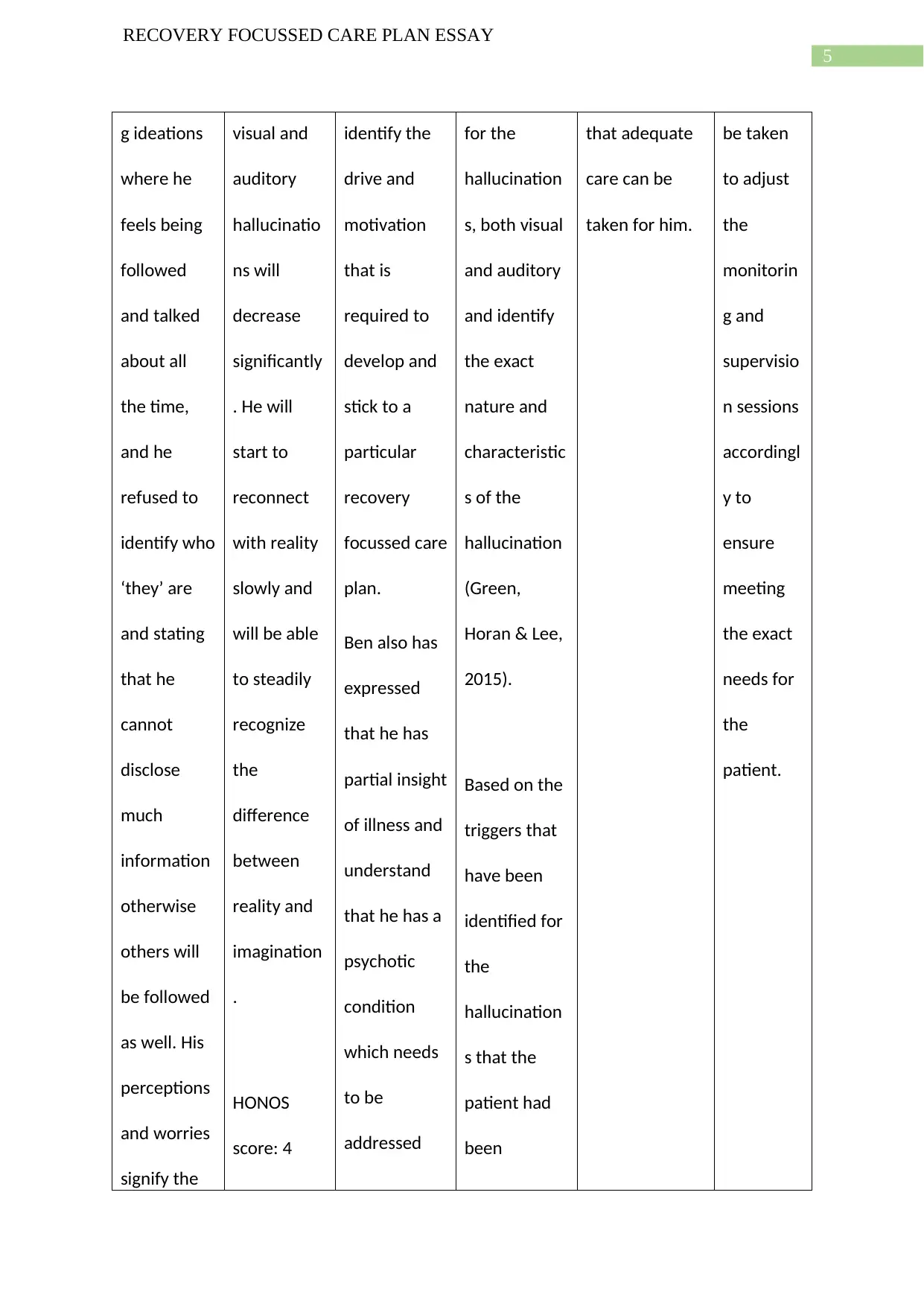
5
RECOVERY FOCUSSED CARE PLAN ESSAY
g ideations
where he
feels being
followed
and talked
about all
the time,
and he
refused to
identify who
‘they’ are
and stating
that he
cannot
disclose
much
information
otherwise
others will
be followed
as well. His
perceptions
and worries
signify the
visual and
auditory
hallucinatio
ns will
decrease
significantly
. He will
start to
reconnect
with reality
slowly and
will be able
to steadily
recognize
the
difference
between
reality and
imagination
.
HONOS
score: 4
identify the
drive and
motivation
that is
required to
develop and
stick to a
particular
recovery
focussed care
plan.
Ben also has
expressed
that he has
partial insight
of illness and
understand
that he has a
psychotic
condition
which needs
to be
addressed
for the
hallucination
s, both visual
and auditory
and identify
the exact
nature and
characteristic
s of the
hallucination
(Green,
Horan & Lee,
2015).
Based on the
triggers that
have been
identified for
the
hallucination
s that the
patient had
been
that adequate
care can be
taken for him.
be taken
to adjust
the
monitorin
g and
supervisio
n sessions
accordingl
y to
ensure
meeting
the exact
needs for
the
patient.
RECOVERY FOCUSSED CARE PLAN ESSAY
g ideations
where he
feels being
followed
and talked
about all
the time,
and he
refused to
identify who
‘they’ are
and stating
that he
cannot
disclose
much
information
otherwise
others will
be followed
as well. His
perceptions
and worries
signify the
visual and
auditory
hallucinatio
ns will
decrease
significantly
. He will
start to
reconnect
with reality
slowly and
will be able
to steadily
recognize
the
difference
between
reality and
imagination
.
HONOS
score: 4
identify the
drive and
motivation
that is
required to
develop and
stick to a
particular
recovery
focussed care
plan.
Ben also has
expressed
that he has
partial insight
of illness and
understand
that he has a
psychotic
condition
which needs
to be
addressed
for the
hallucination
s, both visual
and auditory
and identify
the exact
nature and
characteristic
s of the
hallucination
(Green,
Horan & Lee,
2015).
Based on the
triggers that
have been
identified for
the
hallucination
s that the
patient had
been
that adequate
care can be
taken for him.
be taken
to adjust
the
monitorin
g and
supervisio
n sessions
accordingl
y to
ensure
meeting
the exact
needs for
the
patient.
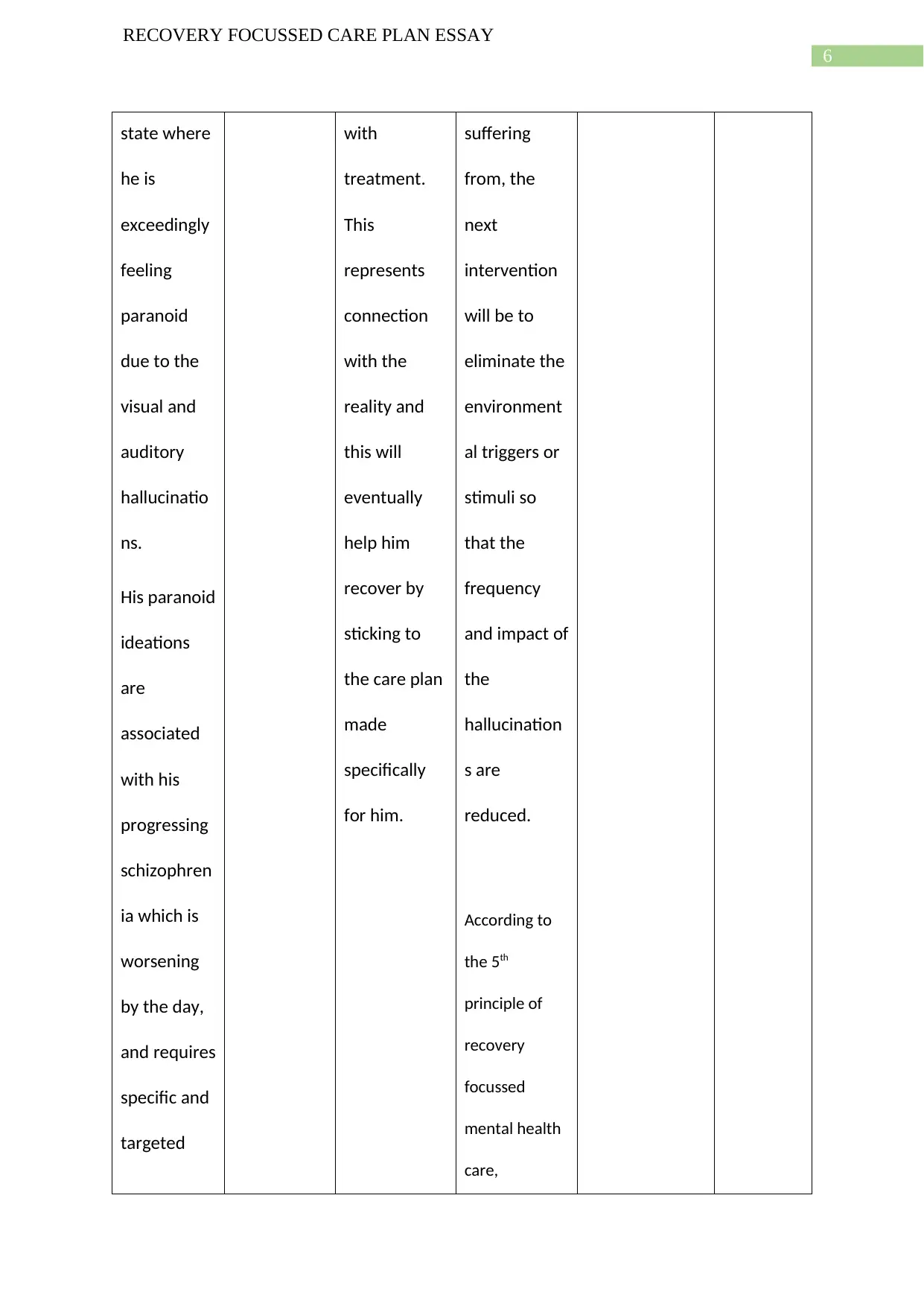
6
RECOVERY FOCUSSED CARE PLAN ESSAY
state where
he is
exceedingly
feeling
paranoid
due to the
visual and
auditory
hallucinatio
ns.
His paranoid
ideations
are
associated
with his
progressing
schizophren
ia which is
worsening
by the day,
and requires
specific and
targeted
with
treatment.
This
represents
connection
with the
reality and
this will
eventually
help him
recover by
sticking to
the care plan
made
specifically
for him.
suffering
from, the
next
intervention
will be to
eliminate the
environment
al triggers or
stimuli so
that the
frequency
and impact of
the
hallucination
s are
reduced.
According to
the 5th
principle of
recovery
focussed
mental health
care,
RECOVERY FOCUSSED CARE PLAN ESSAY
state where
he is
exceedingly
feeling
paranoid
due to the
visual and
auditory
hallucinatio
ns.
His paranoid
ideations
are
associated
with his
progressing
schizophren
ia which is
worsening
by the day,
and requires
specific and
targeted
with
treatment.
This
represents
connection
with the
reality and
this will
eventually
help him
recover by
sticking to
the care plan
made
specifically
for him.
suffering
from, the
next
intervention
will be to
eliminate the
environment
al triggers or
stimuli so
that the
frequency
and impact of
the
hallucination
s are
reduced.
According to
the 5th
principle of
recovery
focussed
mental health
care,
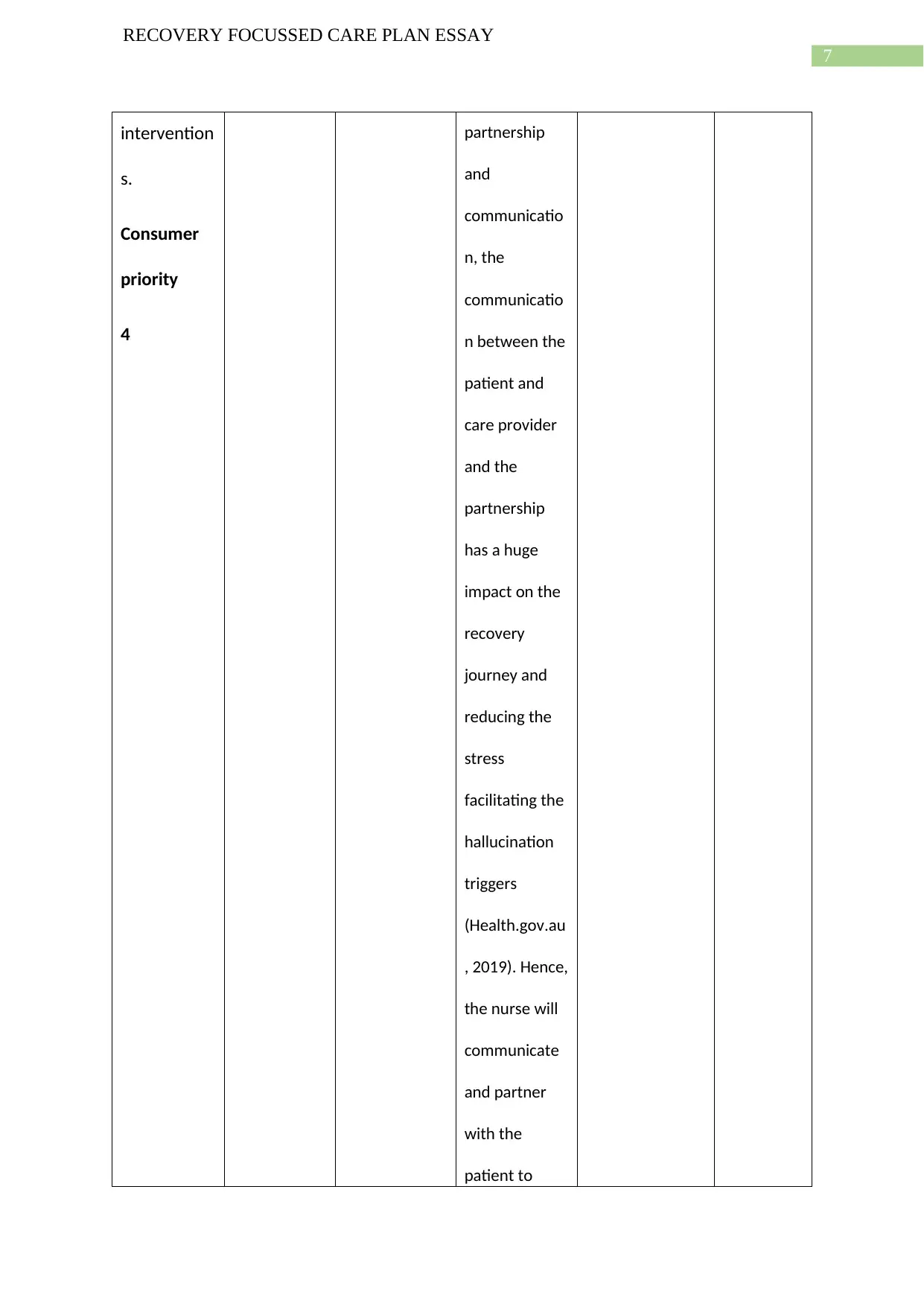
7
RECOVERY FOCUSSED CARE PLAN ESSAY
intervention
s.
Consumer
priority
4
partnership
and
communicatio
n, the
communicatio
n between the
patient and
care provider
and the
partnership
has a huge
impact on the
recovery
journey and
reducing the
stress
facilitating the
hallucination
triggers
(Health.gov.au
, 2019). Hence,
the nurse will
communicate
and partner
with the
patient to
RECOVERY FOCUSSED CARE PLAN ESSAY
intervention
s.
Consumer
priority
4
partnership
and
communicatio
n, the
communicatio
n between the
patient and
care provider
and the
partnership
has a huge
impact on the
recovery
journey and
reducing the
stress
facilitating the
hallucination
triggers
(Health.gov.au
, 2019). Hence,
the nurse will
communicate
and partner
with the
patient to
Paraphrase This Document
Need a fresh take? Get an instant paraphrase of this document with our AI Paraphraser
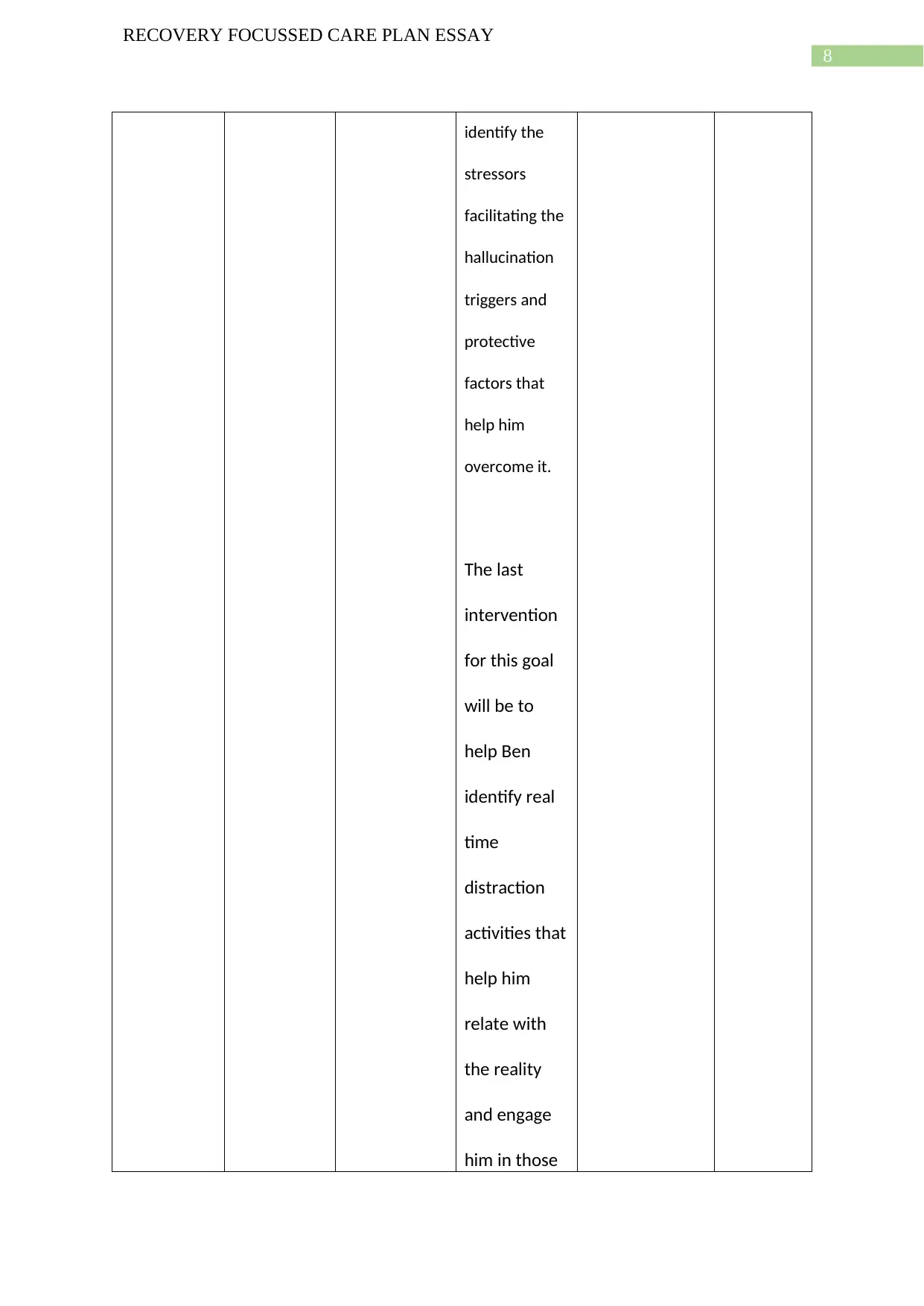
8
RECOVERY FOCUSSED CARE PLAN ESSAY
identify the
stressors
facilitating the
hallucination
triggers and
protective
factors that
help him
overcome it.
The last
intervention
for this goal
will be to
help Ben
identify real
time
distraction
activities that
help him
relate with
the reality
and engage
him in those
RECOVERY FOCUSSED CARE PLAN ESSAY
identify the
stressors
facilitating the
hallucination
triggers and
protective
factors that
help him
overcome it.
The last
intervention
for this goal
will be to
help Ben
identify real
time
distraction
activities that
help him
relate with
the reality
and engage
him in those
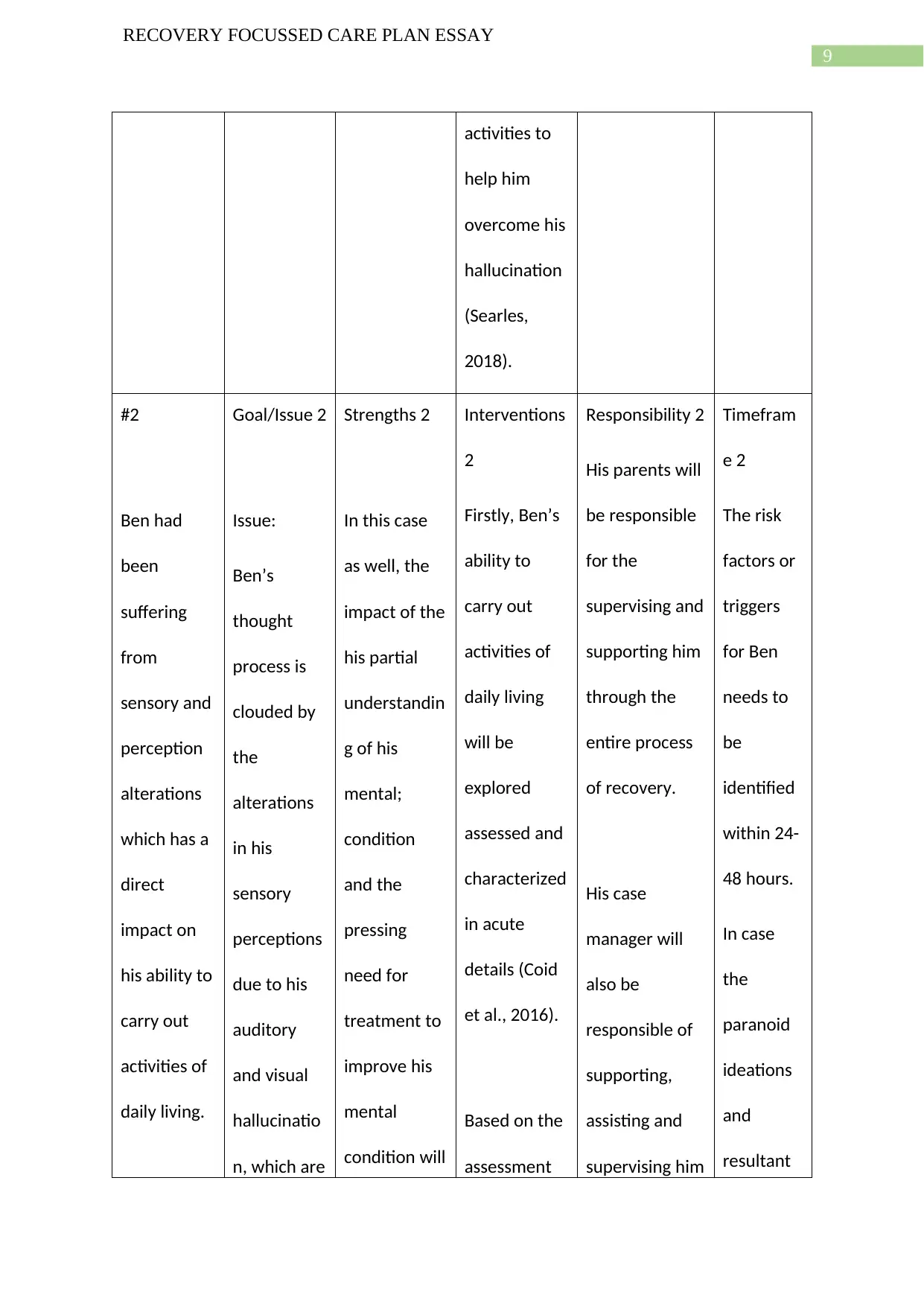
9
RECOVERY FOCUSSED CARE PLAN ESSAY
activities to
help him
overcome his
hallucination
(Searles,
2018).
#2
Ben had
been
suffering
from
sensory and
perception
alterations
which has a
direct
impact on
his ability to
carry out
activities of
daily living.
Goal/Issue 2
Issue:
Ben’s
thought
process is
clouded by
the
alterations
in his
sensory
perceptions
due to his
auditory
and visual
hallucinatio
n, which are
Strengths 2
In this case
as well, the
impact of the
his partial
understandin
g of his
mental;
condition
and the
pressing
need for
treatment to
improve his
mental
condition will
Interventions
2
Firstly, Ben’s
ability to
carry out
activities of
daily living
will be
explored
assessed and
characterized
in acute
details (Coid
et al., 2016).
Based on the
assessment
Responsibility 2
His parents will
be responsible
for the
supervising and
supporting him
through the
entire process
of recovery.
His case
manager will
also be
responsible of
supporting,
assisting and
supervising him
Timefram
e 2
The risk
factors or
triggers
for Ben
needs to
be
identified
within 24-
48 hours.
In case
the
paranoid
ideations
and
resultant
RECOVERY FOCUSSED CARE PLAN ESSAY
activities to
help him
overcome his
hallucination
(Searles,
2018).
#2
Ben had
been
suffering
from
sensory and
perception
alterations
which has a
direct
impact on
his ability to
carry out
activities of
daily living.
Goal/Issue 2
Issue:
Ben’s
thought
process is
clouded by
the
alterations
in his
sensory
perceptions
due to his
auditory
and visual
hallucinatio
n, which are
Strengths 2
In this case
as well, the
impact of the
his partial
understandin
g of his
mental;
condition
and the
pressing
need for
treatment to
improve his
mental
condition will
Interventions
2
Firstly, Ben’s
ability to
carry out
activities of
daily living
will be
explored
assessed and
characterized
in acute
details (Coid
et al., 2016).
Based on the
assessment
Responsibility 2
His parents will
be responsible
for the
supervising and
supporting him
through the
entire process
of recovery.
His case
manager will
also be
responsible of
supporting,
assisting and
supervising him
Timefram
e 2
The risk
factors or
triggers
for Ben
needs to
be
identified
within 24-
48 hours.
In case
the
paranoid
ideations
and
resultant
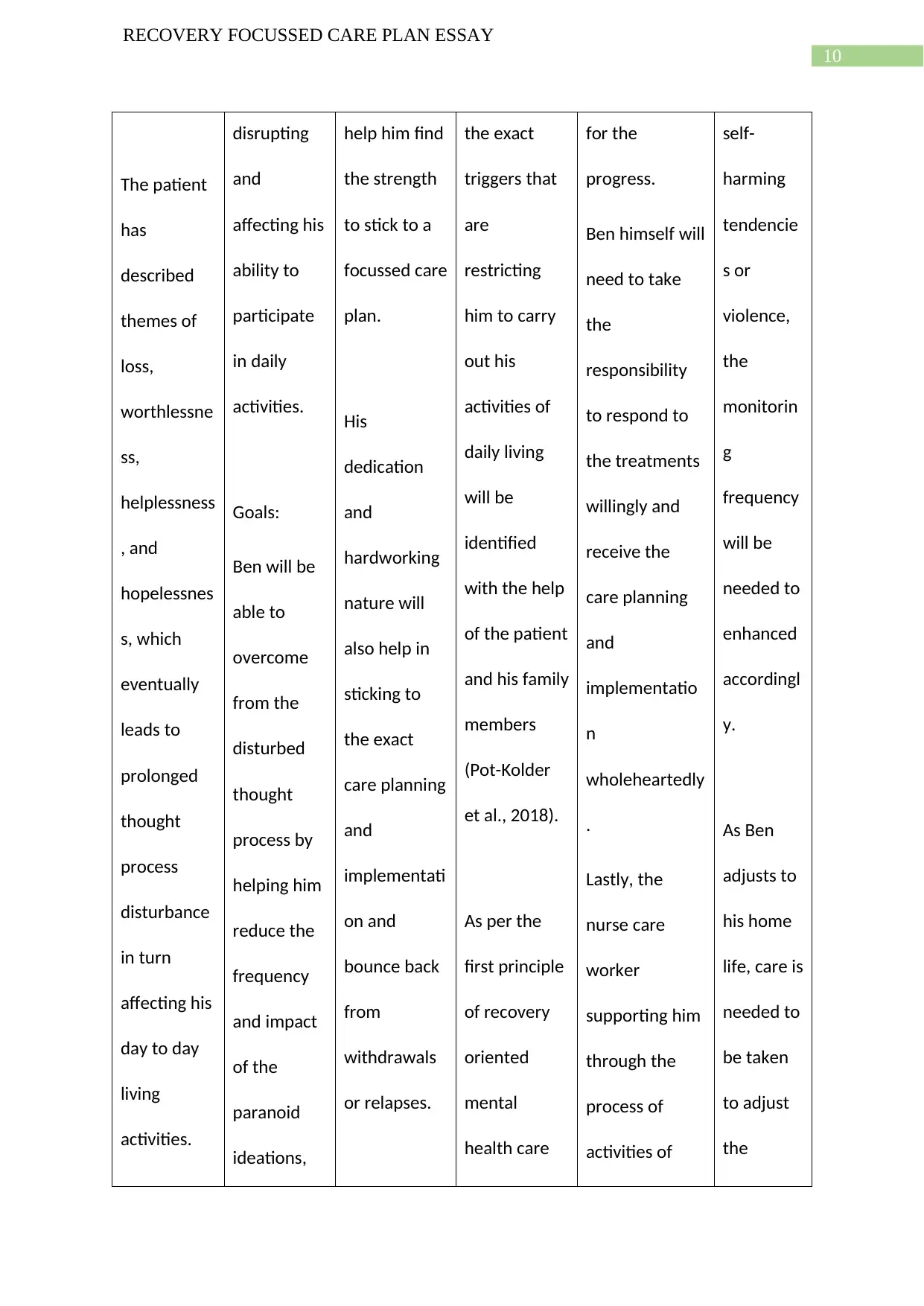
10
RECOVERY FOCUSSED CARE PLAN ESSAY
The patient
has
described
themes of
loss,
worthlessne
ss,
helplessness
, and
hopelessnes
s, which
eventually
leads to
prolonged
thought
process
disturbance
in turn
affecting his
day to day
living
activities.
disrupting
and
affecting his
ability to
participate
in daily
activities.
Goals:
Ben will be
able to
overcome
from the
disturbed
thought
process by
helping him
reduce the
frequency
and impact
of the
paranoid
ideations,
help him find
the strength
to stick to a
focussed care
plan.
His
dedication
and
hardworking
nature will
also help in
sticking to
the exact
care planning
and
implementati
on and
bounce back
from
withdrawals
or relapses.
the exact
triggers that
are
restricting
him to carry
out his
activities of
daily living
will be
identified
with the help
of the patient
and his family
members
(Pot-Kolder
et al., 2018).
As per the
first principle
of recovery
oriented
mental
health care
for the
progress.
Ben himself will
need to take
the
responsibility
to respond to
the treatments
willingly and
receive the
care planning
and
implementatio
n
wholeheartedly
.
Lastly, the
nurse care
worker
supporting him
through the
process of
activities of
self-
harming
tendencie
s or
violence,
the
monitorin
g
frequency
will be
needed to
enhanced
accordingl
y.
As Ben
adjusts to
his home
life, care is
needed to
be taken
to adjust
the
RECOVERY FOCUSSED CARE PLAN ESSAY
The patient
has
described
themes of
loss,
worthlessne
ss,
helplessness
, and
hopelessnes
s, which
eventually
leads to
prolonged
thought
process
disturbance
in turn
affecting his
day to day
living
activities.
disrupting
and
affecting his
ability to
participate
in daily
activities.
Goals:
Ben will be
able to
overcome
from the
disturbed
thought
process by
helping him
reduce the
frequency
and impact
of the
paranoid
ideations,
help him find
the strength
to stick to a
focussed care
plan.
His
dedication
and
hardworking
nature will
also help in
sticking to
the exact
care planning
and
implementati
on and
bounce back
from
withdrawals
or relapses.
the exact
triggers that
are
restricting
him to carry
out his
activities of
daily living
will be
identified
with the help
of the patient
and his family
members
(Pot-Kolder
et al., 2018).
As per the
first principle
of recovery
oriented
mental
health care
for the
progress.
Ben himself will
need to take
the
responsibility
to respond to
the treatments
willingly and
receive the
care planning
and
implementatio
n
wholeheartedly
.
Lastly, the
nurse care
worker
supporting him
through the
process of
activities of
self-
harming
tendencie
s or
violence,
the
monitorin
g
frequency
will be
needed to
enhanced
accordingl
y.
As Ben
adjusts to
his home
life, care is
needed to
be taken
to adjust
the
Secure Best Marks with AI Grader
Need help grading? Try our AI Grader for instant feedback on your assignments.
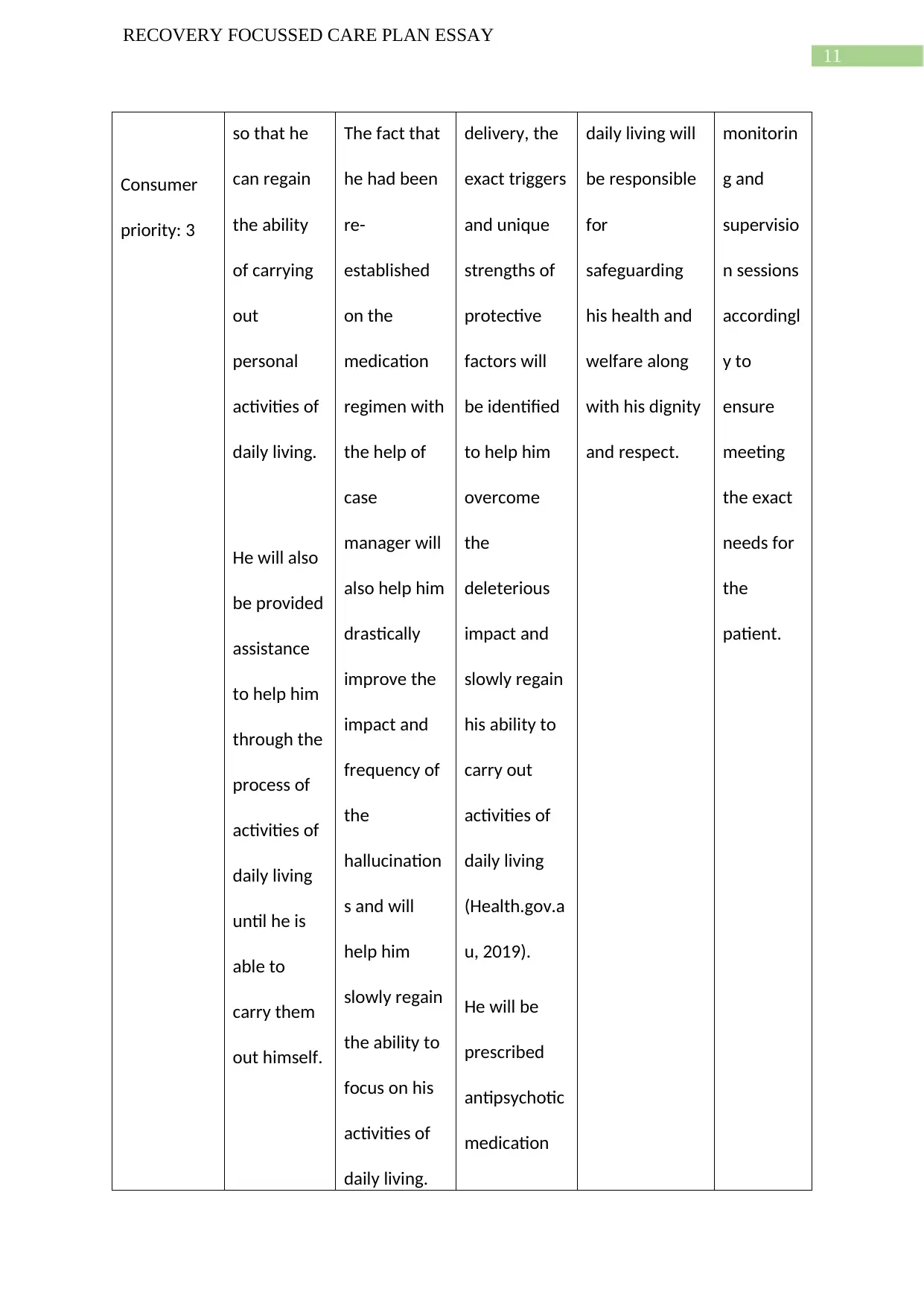
11
RECOVERY FOCUSSED CARE PLAN ESSAY
Consumer
priority: 3
so that he
can regain
the ability
of carrying
out
personal
activities of
daily living.
He will also
be provided
assistance
to help him
through the
process of
activities of
daily living
until he is
able to
carry them
out himself.
The fact that
he had been
re-
established
on the
medication
regimen with
the help of
case
manager will
also help him
drastically
improve the
impact and
frequency of
the
hallucination
s and will
help him
slowly regain
the ability to
focus on his
activities of
daily living.
delivery, the
exact triggers
and unique
strengths of
protective
factors will
be identified
to help him
overcome
the
deleterious
impact and
slowly regain
his ability to
carry out
activities of
daily living
(Health.gov.a
u, 2019).
He will be
prescribed
antipsychotic
medication
daily living will
be responsible
for
safeguarding
his health and
welfare along
with his dignity
and respect.
monitorin
g and
supervisio
n sessions
accordingl
y to
ensure
meeting
the exact
needs for
the
patient.
RECOVERY FOCUSSED CARE PLAN ESSAY
Consumer
priority: 3
so that he
can regain
the ability
of carrying
out
personal
activities of
daily living.
He will also
be provided
assistance
to help him
through the
process of
activities of
daily living
until he is
able to
carry them
out himself.
The fact that
he had been
re-
established
on the
medication
regimen with
the help of
case
manager will
also help him
drastically
improve the
impact and
frequency of
the
hallucination
s and will
help him
slowly regain
the ability to
focus on his
activities of
daily living.
delivery, the
exact triggers
and unique
strengths of
protective
factors will
be identified
to help him
overcome
the
deleterious
impact and
slowly regain
his ability to
carry out
activities of
daily living
(Health.gov.a
u, 2019).
He will be
prescribed
antipsychotic
medication
daily living will
be responsible
for
safeguarding
his health and
welfare along
with his dignity
and respect.
monitorin
g and
supervisio
n sessions
accordingl
y to
ensure
meeting
the exact
needs for
the
patient.
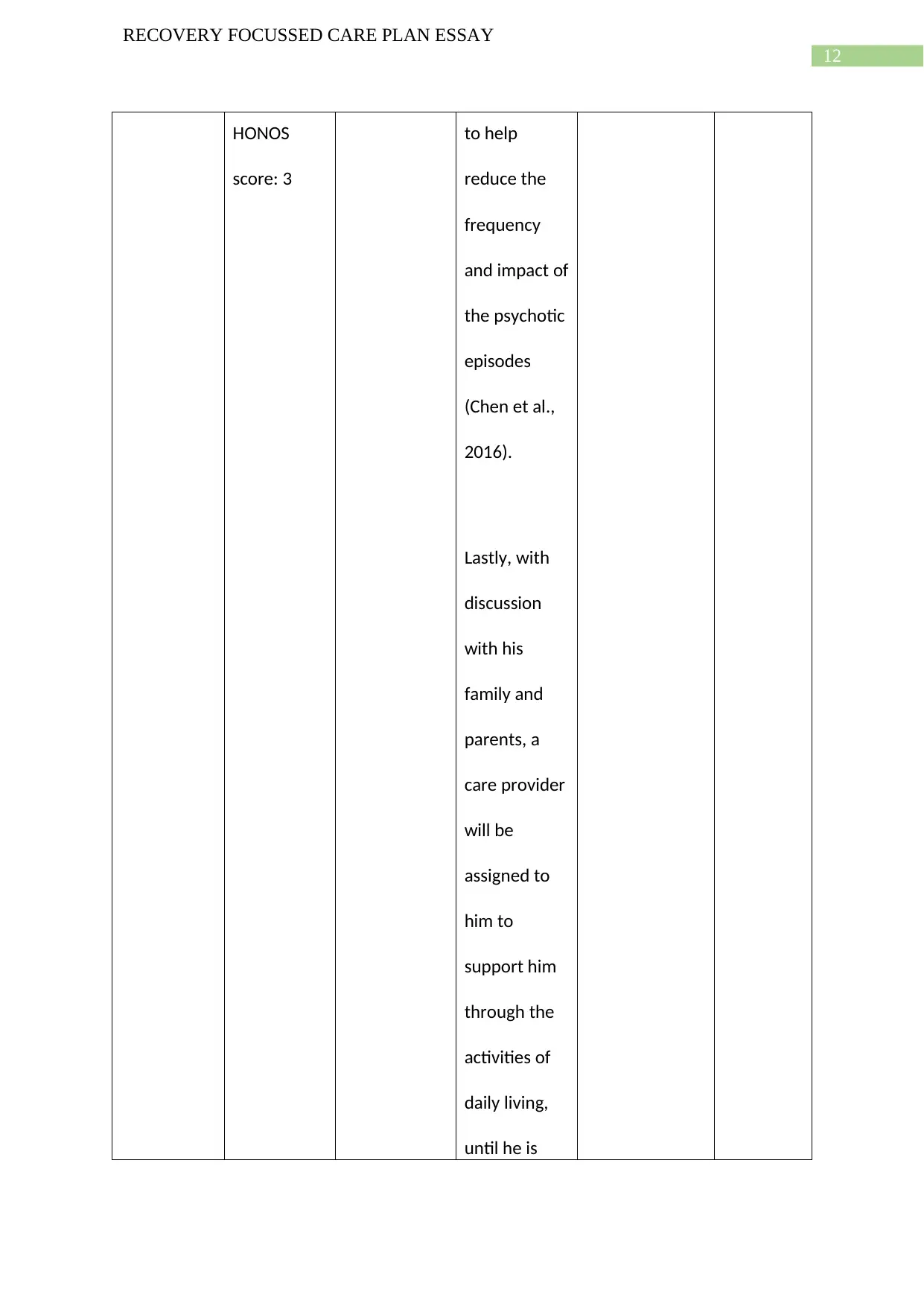
12
RECOVERY FOCUSSED CARE PLAN ESSAY
HONOS
score: 3
to help
reduce the
frequency
and impact of
the psychotic
episodes
(Chen et al.,
2016).
Lastly, with
discussion
with his
family and
parents, a
care provider
will be
assigned to
him to
support him
through the
activities of
daily living,
until he is
RECOVERY FOCUSSED CARE PLAN ESSAY
HONOS
score: 3
to help
reduce the
frequency
and impact of
the psychotic
episodes
(Chen et al.,
2016).
Lastly, with
discussion
with his
family and
parents, a
care provider
will be
assigned to
him to
support him
through the
activities of
daily living,
until he is
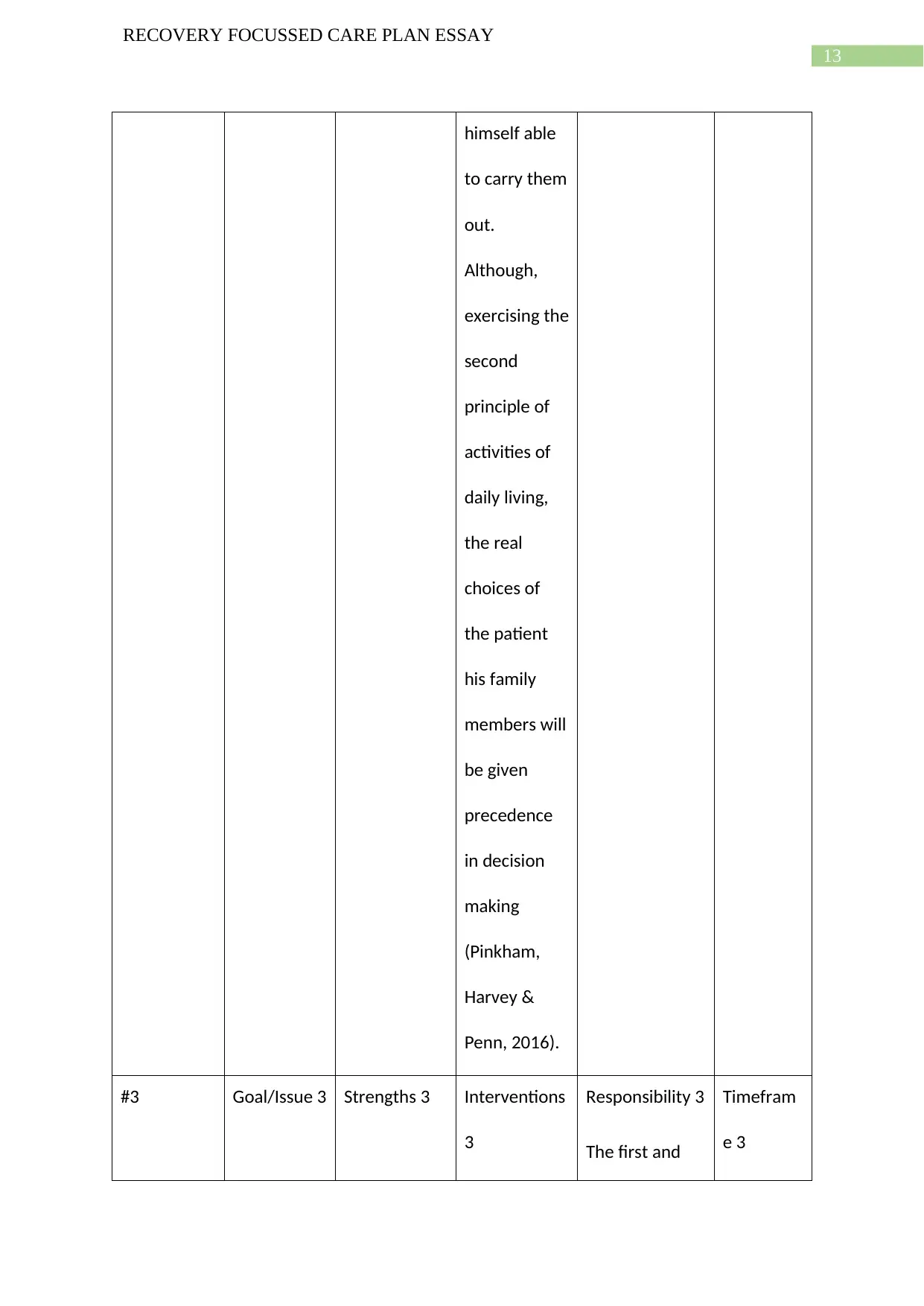
13
RECOVERY FOCUSSED CARE PLAN ESSAY
himself able
to carry them
out.
Although,
exercising the
second
principle of
activities of
daily living,
the real
choices of
the patient
his family
members will
be given
precedence
in decision
making
(Pinkham,
Harvey &
Penn, 2016).
#3 Goal/Issue 3 Strengths 3 Interventions
3
Responsibility 3
The first and
Timefram
e 3
RECOVERY FOCUSSED CARE PLAN ESSAY
himself able
to carry them
out.
Although,
exercising the
second
principle of
activities of
daily living,
the real
choices of
the patient
his family
members will
be given
precedence
in decision
making
(Pinkham,
Harvey &
Penn, 2016).
#3 Goal/Issue 3 Strengths 3 Interventions
3
Responsibility 3
The first and
Timefram
e 3
Paraphrase This Document
Need a fresh take? Get an instant paraphrase of this document with our AI Paraphraser
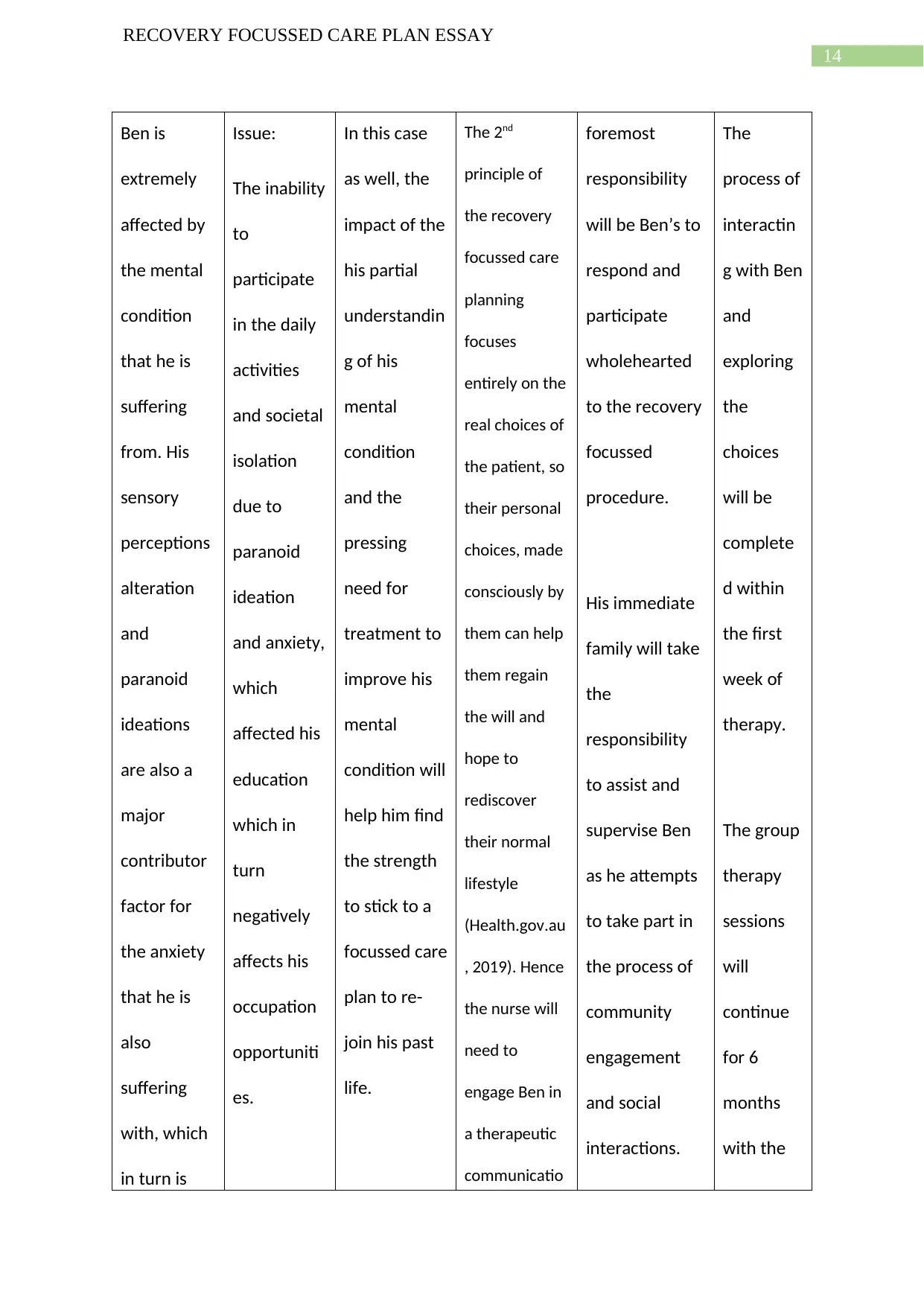
14
RECOVERY FOCUSSED CARE PLAN ESSAY
Ben is
extremely
affected by
the mental
condition
that he is
suffering
from. His
sensory
perceptions
alteration
and
paranoid
ideations
are also a
major
contributor
factor for
the anxiety
that he is
also
suffering
with, which
in turn is
Issue:
The inability
to
participate
in the daily
activities
and societal
isolation
due to
paranoid
ideation
and anxiety,
which
affected his
education
which in
turn
negatively
affects his
occupation
opportuniti
es.
In this case
as well, the
impact of the
his partial
understandin
g of his
mental
condition
and the
pressing
need for
treatment to
improve his
mental
condition will
help him find
the strength
to stick to a
focussed care
plan to re-
join his past
life.
The 2nd
principle of
the recovery
focussed care
planning
focuses
entirely on the
real choices of
the patient, so
their personal
choices, made
consciously by
them can help
them regain
the will and
hope to
rediscover
their normal
lifestyle
(Health.gov.au
, 2019). Hence
the nurse will
need to
engage Ben in
a therapeutic
communicatio
foremost
responsibility
will be Ben’s to
respond and
participate
wholehearted
to the recovery
focussed
procedure.
His immediate
family will take
the
responsibility
to assist and
supervise Ben
as he attempts
to take part in
the process of
community
engagement
and social
interactions.
The
process of
interactin
g with Ben
and
exploring
the
choices
will be
complete
d within
the first
week of
therapy.
The group
therapy
sessions
will
continue
for 6
months
with the
RECOVERY FOCUSSED CARE PLAN ESSAY
Ben is
extremely
affected by
the mental
condition
that he is
suffering
from. His
sensory
perceptions
alteration
and
paranoid
ideations
are also a
major
contributor
factor for
the anxiety
that he is
also
suffering
with, which
in turn is
Issue:
The inability
to
participate
in the daily
activities
and societal
isolation
due to
paranoid
ideation
and anxiety,
which
affected his
education
which in
turn
negatively
affects his
occupation
opportuniti
es.
In this case
as well, the
impact of the
his partial
understandin
g of his
mental
condition
and the
pressing
need for
treatment to
improve his
mental
condition will
help him find
the strength
to stick to a
focussed care
plan to re-
join his past
life.
The 2nd
principle of
the recovery
focussed care
planning
focuses
entirely on the
real choices of
the patient, so
their personal
choices, made
consciously by
them can help
them regain
the will and
hope to
rediscover
their normal
lifestyle
(Health.gov.au
, 2019). Hence
the nurse will
need to
engage Ben in
a therapeutic
communicatio
foremost
responsibility
will be Ben’s to
respond and
participate
wholehearted
to the recovery
focussed
procedure.
His immediate
family will take
the
responsibility
to assist and
supervise Ben
as he attempts
to take part in
the process of
community
engagement
and social
interactions.
The
process of
interactin
g with Ben
and
exploring
the
choices
will be
complete
d within
the first
week of
therapy.
The group
therapy
sessions
will
continue
for 6
months
with the
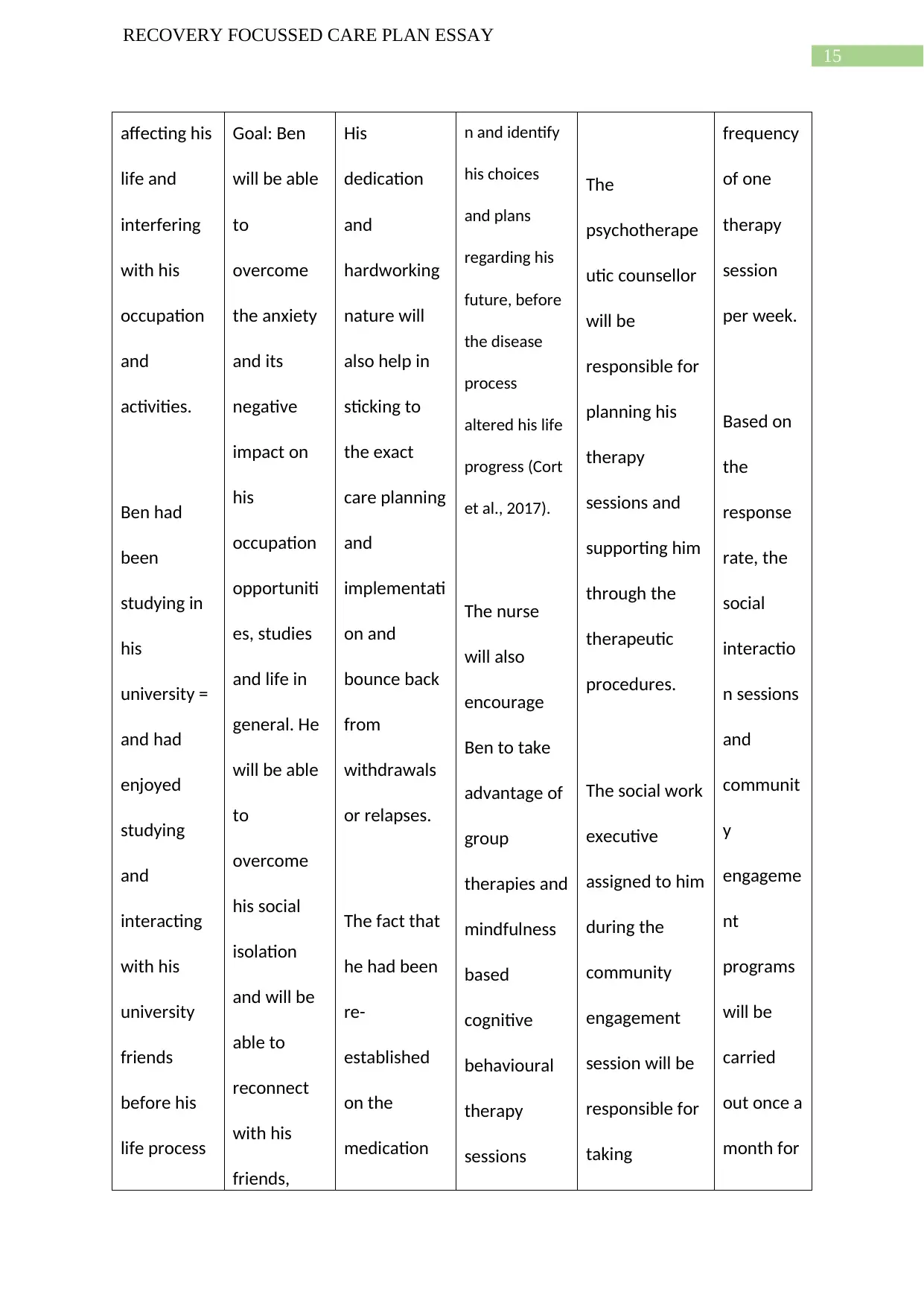
15
RECOVERY FOCUSSED CARE PLAN ESSAY
affecting his
life and
interfering
with his
occupation
and
activities.
Ben had
been
studying in
his
university =
and had
enjoyed
studying
and
interacting
with his
university
friends
before his
life process
Goal: Ben
will be able
to
overcome
the anxiety
and its
negative
impact on
his
occupation
opportuniti
es, studies
and life in
general. He
will be able
to
overcome
his social
isolation
and will be
able to
reconnect
with his
friends,
His
dedication
and
hardworking
nature will
also help in
sticking to
the exact
care planning
and
implementati
on and
bounce back
from
withdrawals
or relapses.
The fact that
he had been
re-
established
on the
medication
n and identify
his choices
and plans
regarding his
future, before
the disease
process
altered his life
progress (Cort
et al., 2017).
The nurse
will also
encourage
Ben to take
advantage of
group
therapies and
mindfulness
based
cognitive
behavioural
therapy
sessions
The
psychotherape
utic counsellor
will be
responsible for
planning his
therapy
sessions and
supporting him
through the
therapeutic
procedures.
The social work
executive
assigned to him
during the
community
engagement
session will be
responsible for
taking
frequency
of one
therapy
session
per week.
Based on
the
response
rate, the
social
interactio
n sessions
and
communit
y
engageme
nt
programs
will be
carried
out once a
month for
RECOVERY FOCUSSED CARE PLAN ESSAY
affecting his
life and
interfering
with his
occupation
and
activities.
Ben had
been
studying in
his
university =
and had
enjoyed
studying
and
interacting
with his
university
friends
before his
life process
Goal: Ben
will be able
to
overcome
the anxiety
and its
negative
impact on
his
occupation
opportuniti
es, studies
and life in
general. He
will be able
to
overcome
his social
isolation
and will be
able to
reconnect
with his
friends,
His
dedication
and
hardworking
nature will
also help in
sticking to
the exact
care planning
and
implementati
on and
bounce back
from
withdrawals
or relapses.
The fact that
he had been
re-
established
on the
medication
n and identify
his choices
and plans
regarding his
future, before
the disease
process
altered his life
progress (Cort
et al., 2017).
The nurse
will also
encourage
Ben to take
advantage of
group
therapies and
mindfulness
based
cognitive
behavioural
therapy
sessions
The
psychotherape
utic counsellor
will be
responsible for
planning his
therapy
sessions and
supporting him
through the
therapeutic
procedures.
The social work
executive
assigned to him
during the
community
engagement
session will be
responsible for
taking
frequency
of one
therapy
session
per week.
Based on
the
response
rate, the
social
interactio
n sessions
and
communit
y
engageme
nt
programs
will be
carried
out once a
month for
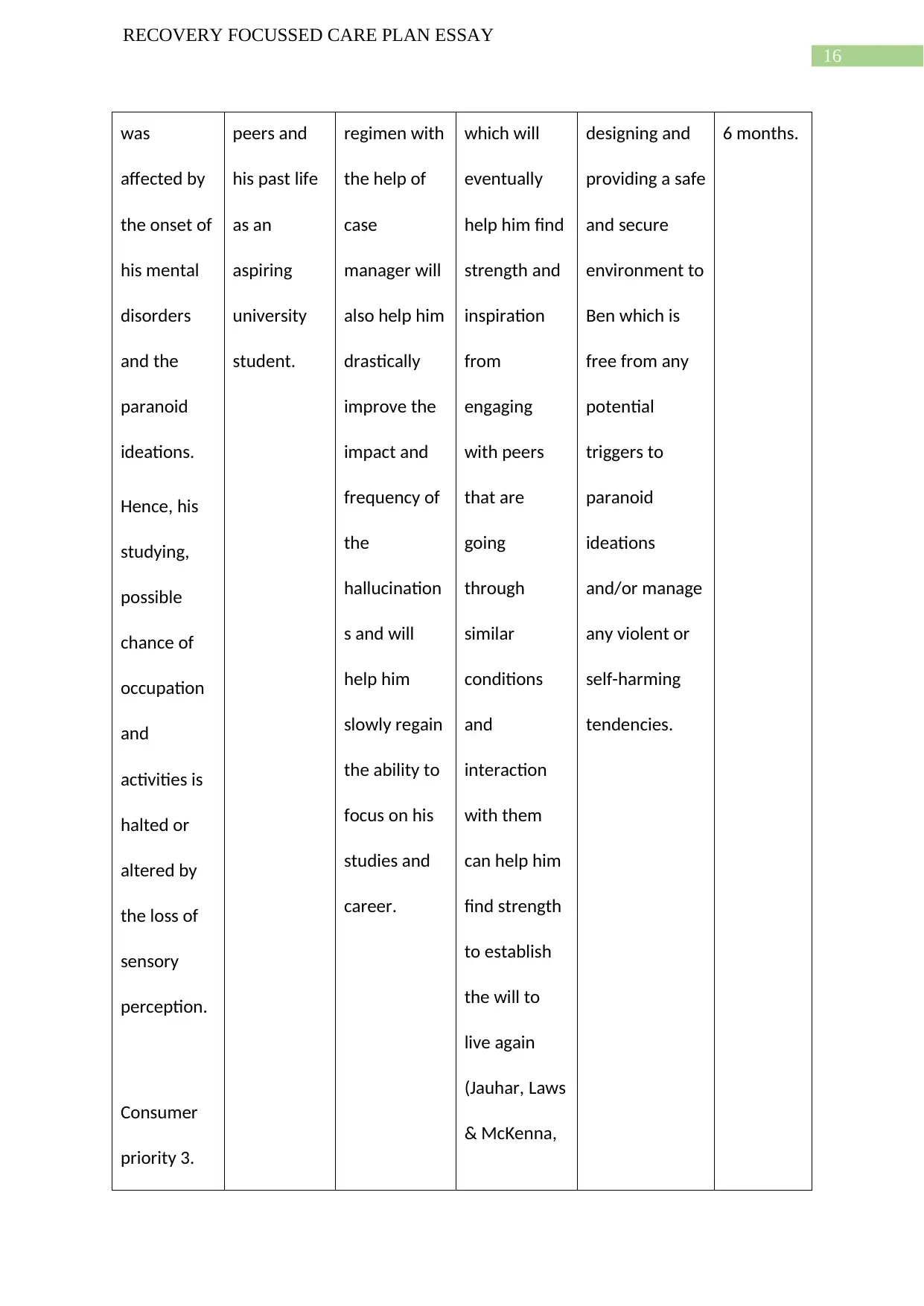
16
RECOVERY FOCUSSED CARE PLAN ESSAY
was
affected by
the onset of
his mental
disorders
and the
paranoid
ideations.
Hence, his
studying,
possible
chance of
occupation
and
activities is
halted or
altered by
the loss of
sensory
perception.
Consumer
priority 3.
peers and
his past life
as an
aspiring
university
student.
regimen with
the help of
case
manager will
also help him
drastically
improve the
impact and
frequency of
the
hallucination
s and will
help him
slowly regain
the ability to
focus on his
studies and
career.
which will
eventually
help him find
strength and
inspiration
from
engaging
with peers
that are
going
through
similar
conditions
and
interaction
with them
can help him
find strength
to establish
the will to
live again
(Jauhar, Laws
& McKenna,
designing and
providing a safe
and secure
environment to
Ben which is
free from any
potential
triggers to
paranoid
ideations
and/or manage
any violent or
self-harming
tendencies.
6 months.
RECOVERY FOCUSSED CARE PLAN ESSAY
was
affected by
the onset of
his mental
disorders
and the
paranoid
ideations.
Hence, his
studying,
possible
chance of
occupation
and
activities is
halted or
altered by
the loss of
sensory
perception.
Consumer
priority 3.
peers and
his past life
as an
aspiring
university
student.
regimen with
the help of
case
manager will
also help him
drastically
improve the
impact and
frequency of
the
hallucination
s and will
help him
slowly regain
the ability to
focus on his
studies and
career.
which will
eventually
help him find
strength and
inspiration
from
engaging
with peers
that are
going
through
similar
conditions
and
interaction
with them
can help him
find strength
to establish
the will to
live again
(Jauhar, Laws
& McKenna,
designing and
providing a safe
and secure
environment to
Ben which is
free from any
potential
triggers to
paranoid
ideations
and/or manage
any violent or
self-harming
tendencies.
6 months.
Secure Best Marks with AI Grader
Need help grading? Try our AI Grader for instant feedback on your assignments.
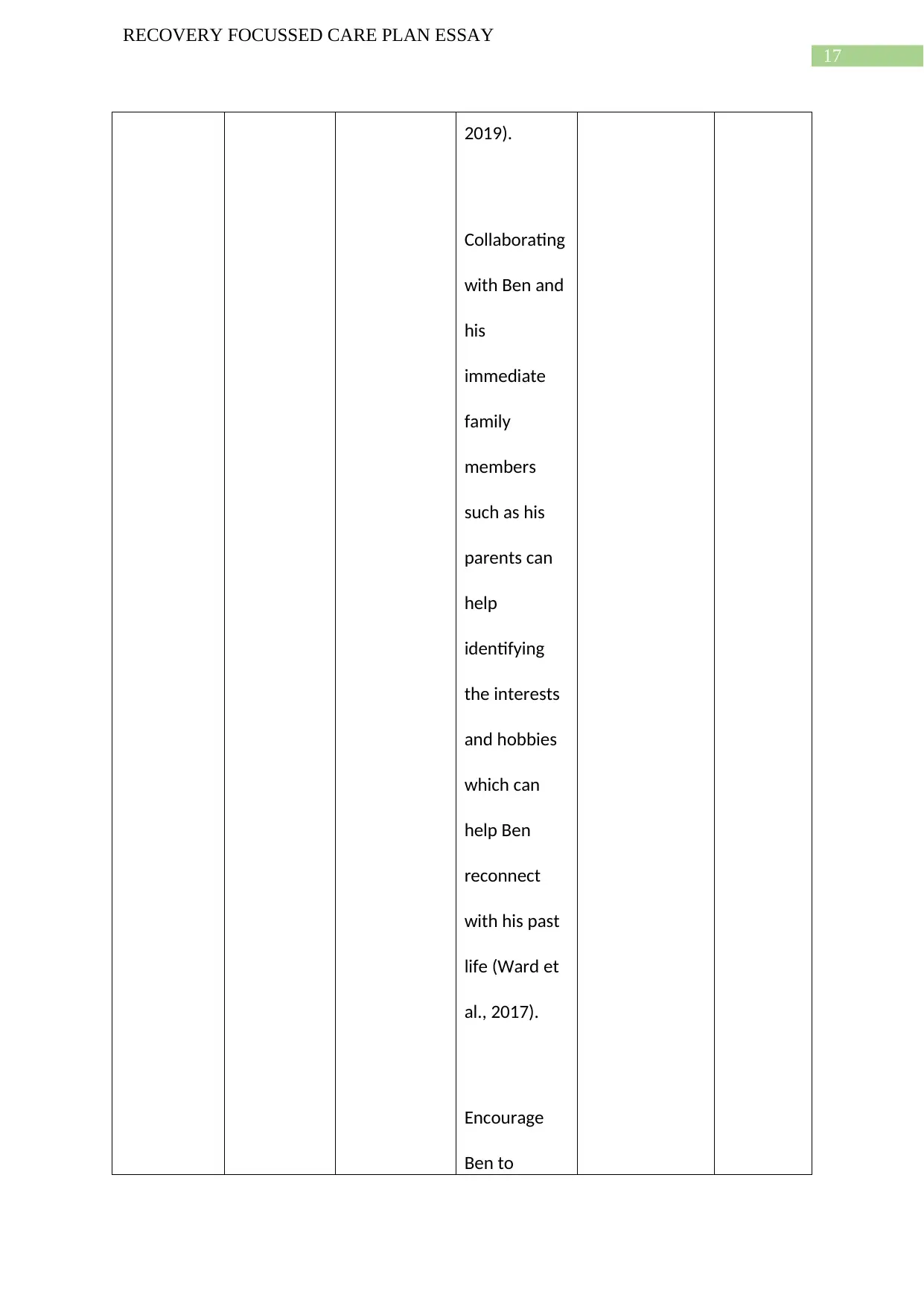
17
RECOVERY FOCUSSED CARE PLAN ESSAY
2019).
Collaborating
with Ben and
his
immediate
family
members
such as his
parents can
help
identifying
the interests
and hobbies
which can
help Ben
reconnect
with his past
life (Ward et
al., 2017).
Encourage
Ben to
RECOVERY FOCUSSED CARE PLAN ESSAY
2019).
Collaborating
with Ben and
his
immediate
family
members
such as his
parents can
help
identifying
the interests
and hobbies
which can
help Ben
reconnect
with his past
life (Ward et
al., 2017).
Encourage
Ben to
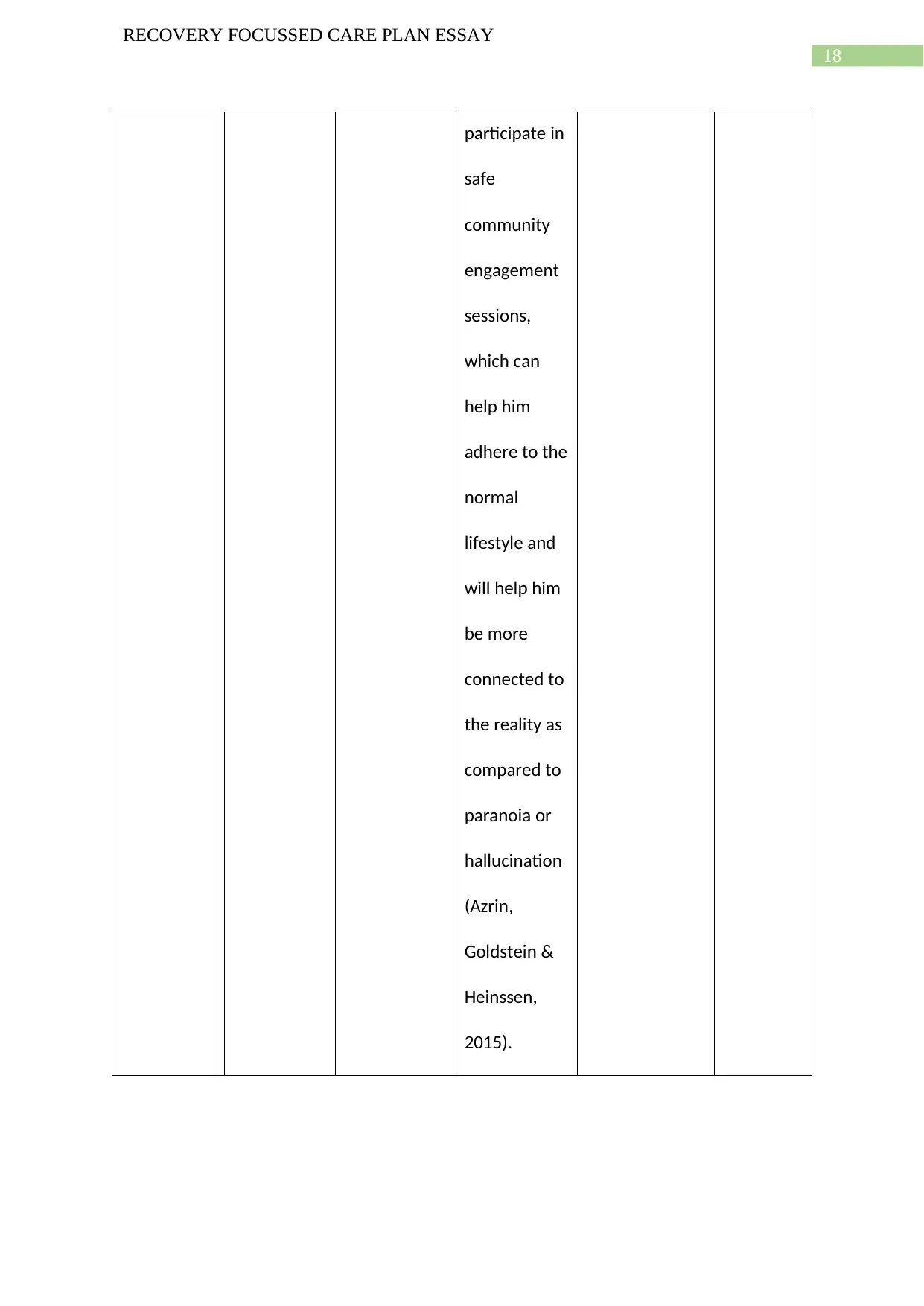
18
RECOVERY FOCUSSED CARE PLAN ESSAY
participate in
safe
community
engagement
sessions,
which can
help him
adhere to the
normal
lifestyle and
will help him
be more
connected to
the reality as
compared to
paranoia or
hallucination
(Azrin,
Goldstein &
Heinssen,
2015).
RECOVERY FOCUSSED CARE PLAN ESSAY
participate in
safe
community
engagement
sessions,
which can
help him
adhere to the
normal
lifestyle and
will help him
be more
connected to
the reality as
compared to
paranoia or
hallucination
(Azrin,
Goldstein &
Heinssen,
2015).
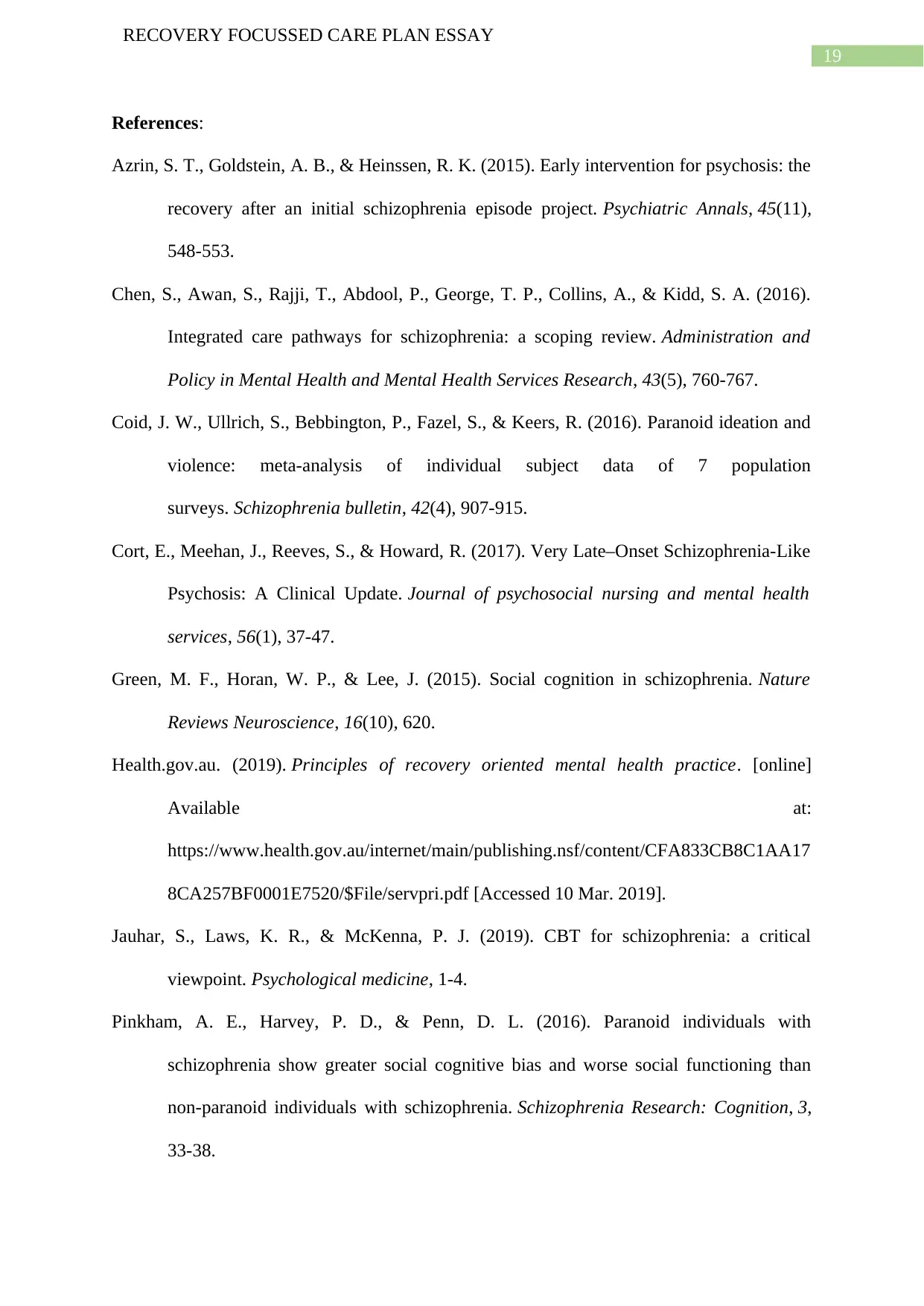
19
RECOVERY FOCUSSED CARE PLAN ESSAY
References:
Azrin, S. T., Goldstein, A. B., & Heinssen, R. K. (2015). Early intervention for psychosis: the
recovery after an initial schizophrenia episode project. Psychiatric Annals, 45(11),
548-553.
Chen, S., Awan, S., Rajji, T., Abdool, P., George, T. P., Collins, A., & Kidd, S. A. (2016).
Integrated care pathways for schizophrenia: a scoping review. Administration and
Policy in Mental Health and Mental Health Services Research, 43(5), 760-767.
Coid, J. W., Ullrich, S., Bebbington, P., Fazel, S., & Keers, R. (2016). Paranoid ideation and
violence: meta-analysis of individual subject data of 7 population
surveys. Schizophrenia bulletin, 42(4), 907-915.
Cort, E., Meehan, J., Reeves, S., & Howard, R. (2017). Very Late–Onset Schizophrenia-Like
Psychosis: A Clinical Update. Journal of psychosocial nursing and mental health
services, 56(1), 37-47.
Green, M. F., Horan, W. P., & Lee, J. (2015). Social cognition in schizophrenia. Nature
Reviews Neuroscience, 16(10), 620.
Health.gov.au. (2019). Principles of recovery oriented mental health practice. [online]
Available at:
https://www.health.gov.au/internet/main/publishing.nsf/content/CFA833CB8C1AA17
8CA257BF0001E7520/$File/servpri.pdf [Accessed 10 Mar. 2019].
Jauhar, S., Laws, K. R., & McKenna, P. J. (2019). CBT for schizophrenia: a critical
viewpoint. Psychological medicine, 1-4.
Pinkham, A. E., Harvey, P. D., & Penn, D. L. (2016). Paranoid individuals with
schizophrenia show greater social cognitive bias and worse social functioning than
non-paranoid individuals with schizophrenia. Schizophrenia Research: Cognition, 3,
33-38.
RECOVERY FOCUSSED CARE PLAN ESSAY
References:
Azrin, S. T., Goldstein, A. B., & Heinssen, R. K. (2015). Early intervention for psychosis: the
recovery after an initial schizophrenia episode project. Psychiatric Annals, 45(11),
548-553.
Chen, S., Awan, S., Rajji, T., Abdool, P., George, T. P., Collins, A., & Kidd, S. A. (2016).
Integrated care pathways for schizophrenia: a scoping review. Administration and
Policy in Mental Health and Mental Health Services Research, 43(5), 760-767.
Coid, J. W., Ullrich, S., Bebbington, P., Fazel, S., & Keers, R. (2016). Paranoid ideation and
violence: meta-analysis of individual subject data of 7 population
surveys. Schizophrenia bulletin, 42(4), 907-915.
Cort, E., Meehan, J., Reeves, S., & Howard, R. (2017). Very Late–Onset Schizophrenia-Like
Psychosis: A Clinical Update. Journal of psychosocial nursing and mental health
services, 56(1), 37-47.
Green, M. F., Horan, W. P., & Lee, J. (2015). Social cognition in schizophrenia. Nature
Reviews Neuroscience, 16(10), 620.
Health.gov.au. (2019). Principles of recovery oriented mental health practice. [online]
Available at:
https://www.health.gov.au/internet/main/publishing.nsf/content/CFA833CB8C1AA17
8CA257BF0001E7520/$File/servpri.pdf [Accessed 10 Mar. 2019].
Jauhar, S., Laws, K. R., & McKenna, P. J. (2019). CBT for schizophrenia: a critical
viewpoint. Psychological medicine, 1-4.
Pinkham, A. E., Harvey, P. D., & Penn, D. L. (2016). Paranoid individuals with
schizophrenia show greater social cognitive bias and worse social functioning than
non-paranoid individuals with schizophrenia. Schizophrenia Research: Cognition, 3,
33-38.
Paraphrase This Document
Need a fresh take? Get an instant paraphrase of this document with our AI Paraphraser
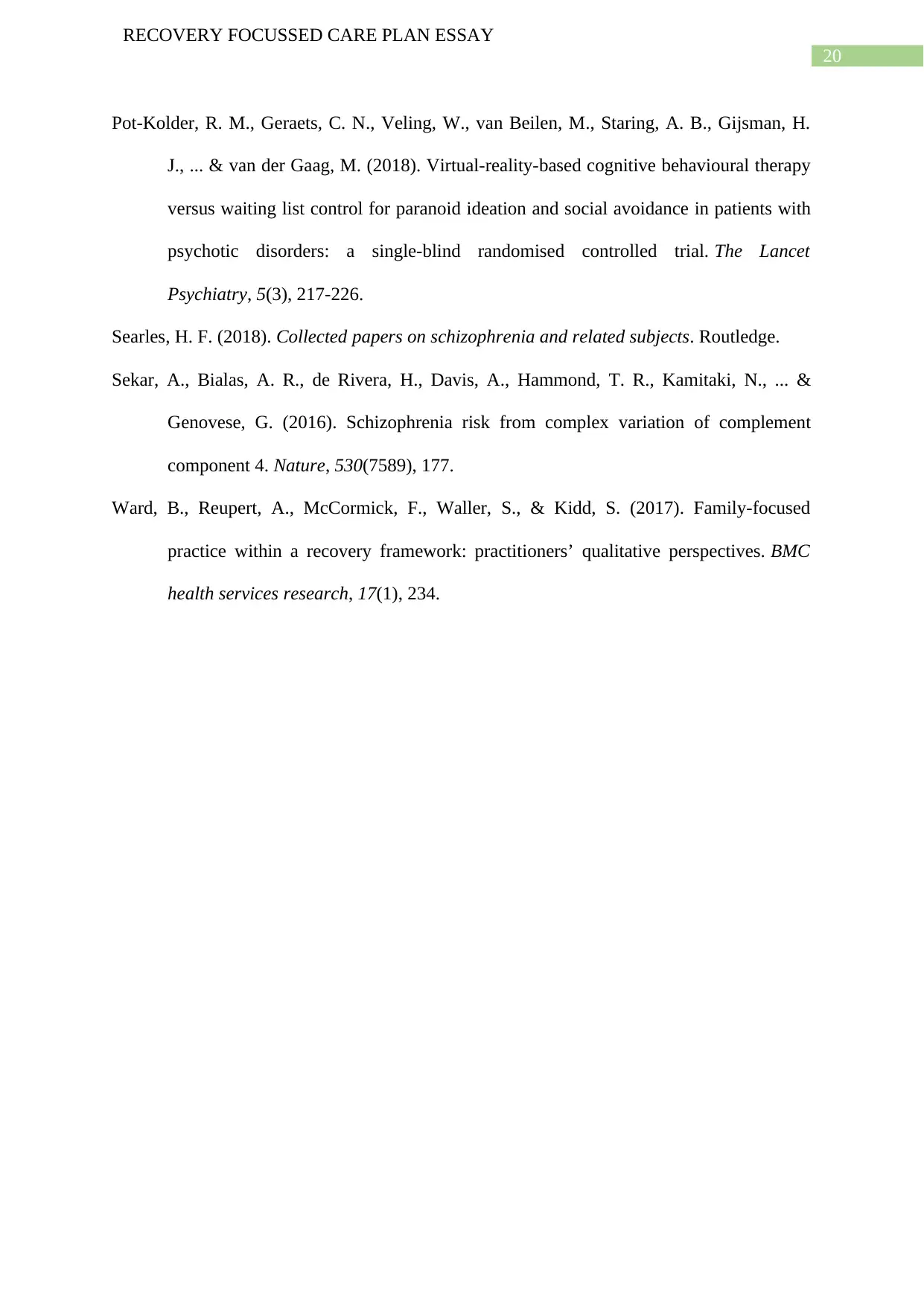
20
RECOVERY FOCUSSED CARE PLAN ESSAY
Pot-Kolder, R. M., Geraets, C. N., Veling, W., van Beilen, M., Staring, A. B., Gijsman, H.
J., ... & van der Gaag, M. (2018). Virtual-reality-based cognitive behavioural therapy
versus waiting list control for paranoid ideation and social avoidance in patients with
psychotic disorders: a single-blind randomised controlled trial. The Lancet
Psychiatry, 5(3), 217-226.
Searles, H. F. (2018). Collected papers on schizophrenia and related subjects. Routledge.
Sekar, A., Bialas, A. R., de Rivera, H., Davis, A., Hammond, T. R., Kamitaki, N., ... &
Genovese, G. (2016). Schizophrenia risk from complex variation of complement
component 4. Nature, 530(7589), 177.
Ward, B., Reupert, A., McCormick, F., Waller, S., & Kidd, S. (2017). Family-focused
practice within a recovery framework: practitioners’ qualitative perspectives. BMC
health services research, 17(1), 234.
RECOVERY FOCUSSED CARE PLAN ESSAY
Pot-Kolder, R. M., Geraets, C. N., Veling, W., van Beilen, M., Staring, A. B., Gijsman, H.
J., ... & van der Gaag, M. (2018). Virtual-reality-based cognitive behavioural therapy
versus waiting list control for paranoid ideation and social avoidance in patients with
psychotic disorders: a single-blind randomised controlled trial. The Lancet
Psychiatry, 5(3), 217-226.
Searles, H. F. (2018). Collected papers on schizophrenia and related subjects. Routledge.
Sekar, A., Bialas, A. R., de Rivera, H., Davis, A., Hammond, T. R., Kamitaki, N., ... &
Genovese, G. (2016). Schizophrenia risk from complex variation of complement
component 4. Nature, 530(7589), 177.
Ward, B., Reupert, A., McCormick, F., Waller, S., & Kidd, S. (2017). Family-focused
practice within a recovery framework: practitioners’ qualitative perspectives. BMC
health services research, 17(1), 234.
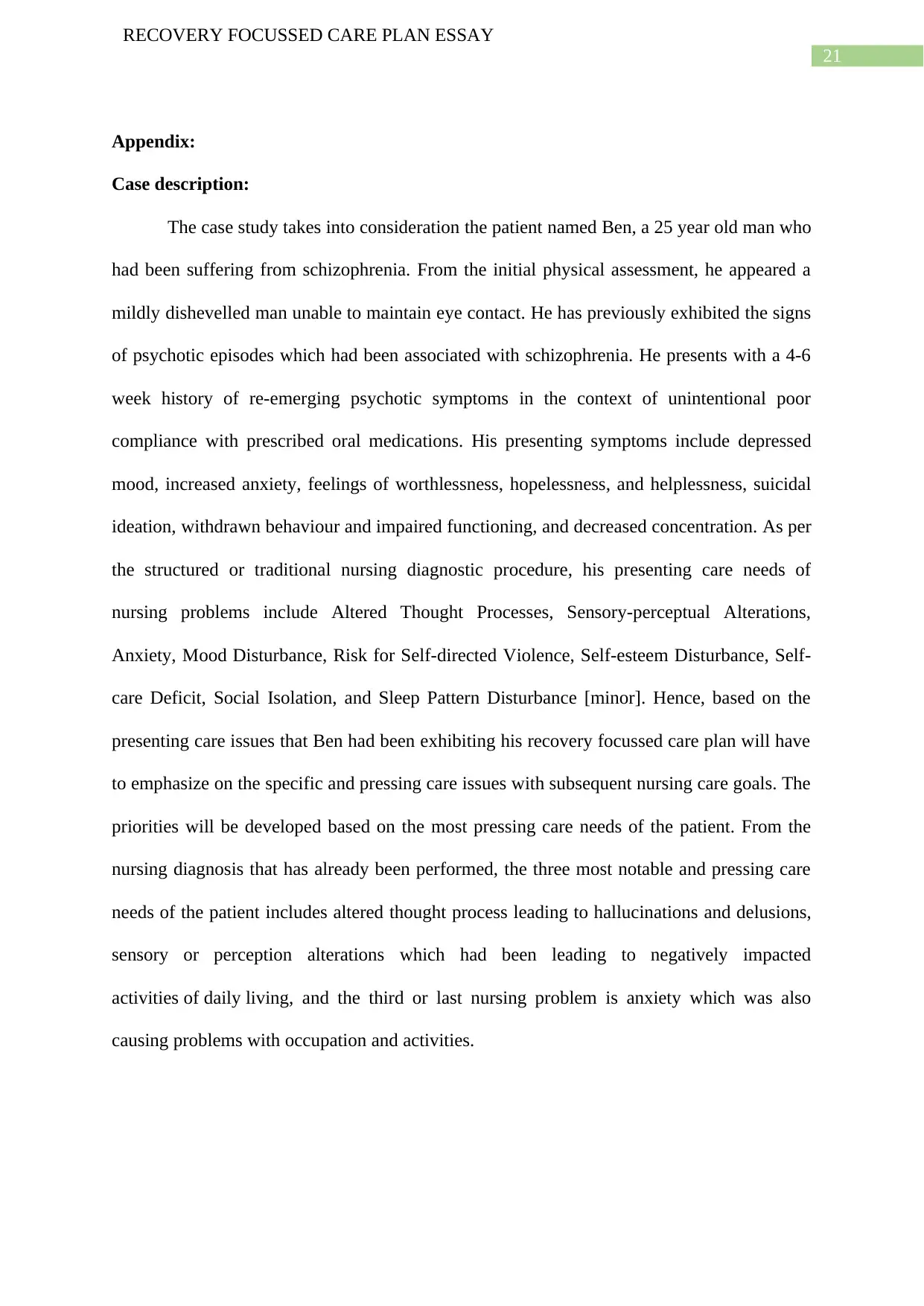
21
RECOVERY FOCUSSED CARE PLAN ESSAY
Appendix:
Case description:
The case study takes into consideration the patient named Ben, a 25 year old man who
had been suffering from schizophrenia. From the initial physical assessment, he appeared a
mildly dishevelled man unable to maintain eye contact. He has previously exhibited the signs
of psychotic episodes which had been associated with schizophrenia. He presents with a 4-6
week history of re-emerging psychotic symptoms in the context of unintentional poor
compliance with prescribed oral medications. His presenting symptoms include depressed
mood, increased anxiety, feelings of worthlessness, hopelessness, and helplessness, suicidal
ideation, withdrawn behaviour and impaired functioning, and decreased concentration. As per
the structured or traditional nursing diagnostic procedure, his presenting care needs of
nursing problems include Altered Thought Processes, Sensory-perceptual Alterations,
Anxiety, Mood Disturbance, Risk for Self-directed Violence, Self-esteem Disturbance, Self-
care Deficit, Social Isolation, and Sleep Pattern Disturbance [minor]. Hence, based on the
presenting care issues that Ben had been exhibiting his recovery focussed care plan will have
to emphasize on the specific and pressing care issues with subsequent nursing care goals. The
priorities will be developed based on the most pressing care needs of the patient. From the
nursing diagnosis that has already been performed, the three most notable and pressing care
needs of the patient includes altered thought process leading to hallucinations and delusions,
sensory or perception alterations which had been leading to negatively impacted
activities of daily living, and the third or last nursing problem is anxiety which was also
causing problems with occupation and activities.
RECOVERY FOCUSSED CARE PLAN ESSAY
Appendix:
Case description:
The case study takes into consideration the patient named Ben, a 25 year old man who
had been suffering from schizophrenia. From the initial physical assessment, he appeared a
mildly dishevelled man unable to maintain eye contact. He has previously exhibited the signs
of psychotic episodes which had been associated with schizophrenia. He presents with a 4-6
week history of re-emerging psychotic symptoms in the context of unintentional poor
compliance with prescribed oral medications. His presenting symptoms include depressed
mood, increased anxiety, feelings of worthlessness, hopelessness, and helplessness, suicidal
ideation, withdrawn behaviour and impaired functioning, and decreased concentration. As per
the structured or traditional nursing diagnostic procedure, his presenting care needs of
nursing problems include Altered Thought Processes, Sensory-perceptual Alterations,
Anxiety, Mood Disturbance, Risk for Self-directed Violence, Self-esteem Disturbance, Self-
care Deficit, Social Isolation, and Sleep Pattern Disturbance [minor]. Hence, based on the
presenting care issues that Ben had been exhibiting his recovery focussed care plan will have
to emphasize on the specific and pressing care issues with subsequent nursing care goals. The
priorities will be developed based on the most pressing care needs of the patient. From the
nursing diagnosis that has already been performed, the three most notable and pressing care
needs of the patient includes altered thought process leading to hallucinations and delusions,
sensory or perception alterations which had been leading to negatively impacted
activities of daily living, and the third or last nursing problem is anxiety which was also
causing problems with occupation and activities.
1 out of 21
Related Documents
Your All-in-One AI-Powered Toolkit for Academic Success.
+13062052269
info@desklib.com
Available 24*7 on WhatsApp / Email
![[object Object]](/_next/static/media/star-bottom.7253800d.svg)
Unlock your academic potential
© 2024 | Zucol Services PVT LTD | All rights reserved.




